In Focus This Week
Legislation Update
States consider options to ensure that noncitizens aren’t voting
By Wendy Underhill
National Conference of State Legislatures
What a difference a century can make in deciding who can vote.
Before 1925, states went back and forth between permitting noncitizens to vote and requiring citizenship as a qualification. Most states at some point allowed noncitizens to vote, a little-known fact examined by the political scientist Ron Hayduk in the Journal of International Migration and Integration.
 Fast forward 100 years: Nowhere in the nation is it permissible for noncitizens to vote in federal elections after the passage of the Illegal Immigration Reform and Immigrant Responsibility Act in 1996.
Fast forward 100 years: Nowhere in the nation is it permissible for noncitizens to vote in federal elections after the passage of the Illegal Immigration Reform and Immigrant Responsibility Act in 1996.
Still, legislation to clarify that noncitizens can’t vote in state elections has been ticking up since 2021, with a growing number of states considering ways to ensure noncitizens aren’t casting ballots. In 2025, over 100 bills have already been introduced addressing voting and citizenship.
Is noncitizen voting a problem? Some states have been trying to find out. In 2024, Georgia conducted a citizenship audit of its voter rolls and found 20 noncitizens, nine of whom had voted at some point. Ohio conducted a citizenship verification audit and forwarded to the attorney general the records of 138 voters lacking evidence of citizenship. In 2022, Texas conducted a procedural audit of Harris County’s elections, which included a review of list maintenance activities. Using data from the Texas Department of Public Safety, the audit found that there were potentially 269 noncitizens on the voter rolls statewide, with 47 of them in the county. The audit also confirmed that Harris County cancelled the noncitizen matches before the election and that no one on the list cast a ballot.
As for the public, a 2024 Pew Research Center study on voter confidence showed “nearly identical majorities of all voters say it is very or somewhat important to stop noncitizens from voting (90%) and to prevent people who are not qualified to vote from doing so (89%).” Pointing to the Pew data, former Colorado Secretary of State Wayne Williams (R) says no method of preventing noncitizen voting is perfect. “It’s clear that states should use the resources available,” he says, referring to creating processes for verifying citizenship status and, if necessary, removing names from voter lists. As both a former county clerk and secretary of state, Williams provided notice and an opportunity to be heard to individuals before final removal took place. “I wanted to make sure that we removed noncitizens while protecting citizens’ right to vote,” he says.
In Congress, House Republicans reintroduced the SAVE Act, which would require all Americans to present documentary proof of citizenship for voting in federal elections. The House passed the bill, which does not address funding, in the last Congress, but it stalled in the Senate.
What States Are Doing
Whether or not Congress acts, states absolutely are in high gear. In 2024, eight states amended their constitutions away from “every citizen” can vote to “only citizens” can vote. That brings to 15 the total number of states with explicit prohibitions.
What are states’ options as they consider ways to prevent noncitizen voting?
Beyond changing constitutional language, states can also rev up their voter list maintenance processes—all of which takes staff time. All states regularly scrub their voter rolls based on eligibility requirements of age, residency and citizenship.
In the last dozen years, states have sought ways to check citizenship, too—and it’s not an easy job, in part because there is no list of U.S. citizens anywhere. The federal Department of Homeland Security maintains a database—Systematic Alien Verification for Entitlement, or SAVE—of those who are in the U.S. legally but who are not citizens. States can, after requisite agreements are completed, check individual registrations against the database if they have that person’s “alien registration number.”
Another option: require new voters to show proof of citizenship when they register. For most new voters, that isn’t a problem; they show a birth certificate or passport at the bureau of motor vehicles to get a REAL ID, and that proof can be used for voter registration. (The REAL ID is not itself proof of citizenship, because they are available to noncitizens who are in the U.S. legally; it is the underlying document shown by a citizen to obtain a REAL ID that can be used for voting purposes.)
It’s a rare person who carries their birth certificate or passport when they go to the grocery store or public library, so if someone with a clipboard asks them to register, proof won’t be available. However, states can be sure the form asks for the driver’s license number, state ID number or last four digits of a Social Security number so that before those paper registrations are accepted, officials can check the numbers to verify that proof has been offered previously.
Some citizens, however, do not have a birth certificate or passport. Perhaps they were born at home decades ago and a birth certificate was never created. Or their copy was destroyed and never replaced. Over 9% of voting-age U.S. citizens say they can’t readily access documentary proof of citizenship, and just under 2% say they do not have any form of proof, according to a 2024 report, “Who Lacks ID in America Today: An Exploration of Voter ID Access, Barriers and Knowledge,” from the University of Maryland’s Center for Democracy and Civic Engagement.
Requiring Proof
Some say requiring proof of citizenship is voter ID redux, in that in the 2010s proof of identity—that is, voter ID for in-person voting–was the hot issue. The arguments may be the similar, but proof of citizenship is at the point of registration, not during voting itself.
Arizona has required proof of citizenship since a statewide ballot measure, Proposition 200, passed in 2004. Those who can’t show proof of citizenship can’t vote in federal or state elections, with one exception. If those people used the National Mail Voter Registration Form, which does not require proof of citizenship, they can vote in federal elections but not state elections. (State law governs state elections; federal law governs federal elections.) Arizona refers to this as a “bifurcated” system, one set of ballots for those who can vote on everything and another set of ballots for “federal only” voters. The federal ballots come in nine versions, one for each congressional district.
How many people use the federal form? There are no national statistics. In Minnesota, “anecdotally, it would be a needle in a haystack,” says Paul Linnell, deputy elections director in the office of the Minnesota secretary of state. In 2023, Virginia received 1,735 federal forms out of about 300,000 new registrations, or 0.6% of the total.
Arizona has been in almost nonstop litigation since enacting documentary proof of citizenship. As other states consider going that way, they may look to Arizona for legal lessons.
Or, turn to Georgia, which passed a proof of citizenship law in 2009. In recent years, its automated voter registration and its adoption of Real ID in 2016 have proved helpful in reducing the likelihood that noncitizens could get on the rolls. “Everybody who comes to get a license or renews has to prove their citizenship for their information to get sent to the registrar,” says Blake Evans, the state’s elections director.
Georgia’s registration form also asks for the registrant’s driver’s license or state ID card number or, if those aren’t available, the last four digits of their Social Security number.
Evans says that for anyone who uses a paper form to register, their driver’s license or state ID number will be bounced against motor vehicle records to see if they have shown proof of citizenship. If they have not, the registration will be placed in “pending citizenship status” and they will be notified that they cannot vote unless they take action to prove their citizenship.
For more on state action on citizenship and voting see NCSL’s new webpage Legislative Approaches to Ensuring Only Citizens Vote.
Some Local Jurisdictions Permit Noncitizens Voting
While the trend is toward explicit language that prohibits noncitizens from voting, a countertrend is forming. Washington, D.C., and a smattering of local jurisdictions permit noncitizens to vote in local elections.
New York City was on that list, too, having enacted a measure in 2022 to allow noncitizens to vote in city elections. In February 2024, a state appeals court ruled the law unconstitutional. The law was never implemented and is on hold pending a possible appeal.
Immigrant Voting Rights, an advocacy group, lists 17 jurisdictions that allow immigrants to legally vote in local elections: 10 municipalities in Maryland, three in Vermont, two in California, New York City (though not currently in effect) and Washington, D.C. Except in the Maryland towns and San Francisco, these rules have all passed since 2020.
Wendy Underhill directs NCSL’s Elections and Redistricting Program.
This article was reprinted with permission from the National Conference of State Legislatures.
electionline Daily News Email
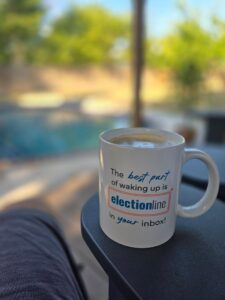 What’s the best part of waking up? electionline Daily News in your inbox of course so be sure to sign up for your daily dose.
What’s the best part of waking up? electionline Daily News in your inbox of course so be sure to sign up for your daily dose.
Each morning you’ll receive the top headlines of the day, plus a listing of states featured in that day’s news round up.
To sign up, simply visit our site and provide us with your email and you’ll begin receiving the news in your inbox each morning.
We Google so you don’t have to!
Election News This Week
 Election Security Update: There is still a lot of uncertainty surrounding the future of the Cybersecurity and Infrastructure Security Agency (CISA) and its role in election security, but here is what we know about this point. At this point, the agency has frozen all of its work in election security and according to Wired, in a memo sent Feb. 14 to all CISA employees, CISA’s acting director, Bridget Bean, said she was ordering “a review and assessment” of every position at the agency related to election security and countering mis- and disinformation, “as well as every election security and [mis-, dis-, and malinformation] product, activity, service, and program that has been carried out” since the federal government designated election systems as critical infrastructure in 2017. “CISA will pause all elections security activities until the completion of this review,” Bean added. The agency is also cutting off funding for these activities at the EI-ISAC. “It is necessary to rescope the agency’s election security activities to ensure CISA is focused exclusively on executing its cyber and physical security mission,” she told employees in the memo. The top Democrats on the Senate and House committees overseeing election legislation wrote a letter last week to CISA’s top leaders to express “grave concern” over the changes and request more information about how those changes will affect election security. Additionally, new Attorney General Pam Bondi disbanded an FBI task force focused on investigating foreign influence operations, including those that target U.S. elections. She wrote that the changes would “free resources to address more pressing priorities, and end risks of further weaponization and abuses of prosecutorial discretion.” According to an article published by The Associated Press, the actions send a message that securing U.S. elections against interference from countries such as Russia, China and Iran is no longer a federal government priority, said Larry Norden, an election expert with the Brennan Center for Justice. “I think we would be naive to think that the bad guys don’t get that message, too, that there’s going to be less of a cop on the beat to protect our elections,” he said.
Election Security Update: There is still a lot of uncertainty surrounding the future of the Cybersecurity and Infrastructure Security Agency (CISA) and its role in election security, but here is what we know about this point. At this point, the agency has frozen all of its work in election security and according to Wired, in a memo sent Feb. 14 to all CISA employees, CISA’s acting director, Bridget Bean, said she was ordering “a review and assessment” of every position at the agency related to election security and countering mis- and disinformation, “as well as every election security and [mis-, dis-, and malinformation] product, activity, service, and program that has been carried out” since the federal government designated election systems as critical infrastructure in 2017. “CISA will pause all elections security activities until the completion of this review,” Bean added. The agency is also cutting off funding for these activities at the EI-ISAC. “It is necessary to rescope the agency’s election security activities to ensure CISA is focused exclusively on executing its cyber and physical security mission,” she told employees in the memo. The top Democrats on the Senate and House committees overseeing election legislation wrote a letter last week to CISA’s top leaders to express “grave concern” over the changes and request more information about how those changes will affect election security. Additionally, new Attorney General Pam Bondi disbanded an FBI task force focused on investigating foreign influence operations, including those that target U.S. elections. She wrote that the changes would “free resources to address more pressing priorities, and end risks of further weaponization and abuses of prosecutorial discretion.” According to an article published by The Associated Press, the actions send a message that securing U.S. elections against interference from countries such as Russia, China and Iran is no longer a federal government priority, said Larry Norden, an election expert with the Brennan Center for Justice. “I think we would be naive to think that the bad guys don’t get that message, too, that there’s going to be less of a cop on the beat to protect our elections,” he said.
 Oops!: Thousands of California residents received an automated reminder this week that election day is next week — except for most voters, it isn’t. The erroneous messages sent by email to Los Angeles County and Orange County voters arrived with a subject line that read “One Week Left to Return Your Ballot,” and told voters that “is the last day for your ballot to be mailed and postmarked,” omitting the day. Reminders sent by text message said: “Drop your ballot at a nearby drop box or voting location by 8 pm on.” Elections officials said the incomplete messages originated with BallotTrax, the software that sends automated messages to voters about the status of their mail ballots. The Denver-based company has worked with the California Secretary of State since 2020. Steve Olsen, the president of BallotTrax, told the Los Angeles Times that the automated reminders should have gone out to about 100,000 voters in two legislative districts that include parts of Los Angeles, Orange, Kern and Tulare counties. Special primary elections are being held in those districts next week. “Due to a geo-targeting error, the reminder went out to many other voters,” Olsen said in an email. He said the company is still investigating and will send a retraction as soon as they determine which voters received the messages in error. The Los Angeles County Registrar-Recorder’s office said that “nearly all” voters in L.A. County who subscribe to BallotTrax updates received the erroneous messages.
Oops!: Thousands of California residents received an automated reminder this week that election day is next week — except for most voters, it isn’t. The erroneous messages sent by email to Los Angeles County and Orange County voters arrived with a subject line that read “One Week Left to Return Your Ballot,” and told voters that “is the last day for your ballot to be mailed and postmarked,” omitting the day. Reminders sent by text message said: “Drop your ballot at a nearby drop box or voting location by 8 pm on.” Elections officials said the incomplete messages originated with BallotTrax, the software that sends automated messages to voters about the status of their mail ballots. The Denver-based company has worked with the California Secretary of State since 2020. Steve Olsen, the president of BallotTrax, told the Los Angeles Times that the automated reminders should have gone out to about 100,000 voters in two legislative districts that include parts of Los Angeles, Orange, Kern and Tulare counties. Special primary elections are being held in those districts next week. “Due to a geo-targeting error, the reminder went out to many other voters,” Olsen said in an email. He said the company is still investigating and will send a retraction as soon as they determine which voters received the messages in error. The Los Angeles County Registrar-Recorder’s office said that “nearly all” voters in L.A. County who subscribe to BallotTrax updates received the erroneous messages.
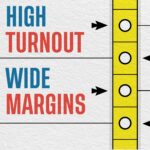 Podcast News: After a brief hiatus, the High Turnout Wide Margins podcast is back! In this episode, hosts Eric Fey and Brianna Lennon speak with Trent Tripple in Ada County, Idaho. Trent was integral in implementing the new Ballot Verifier system in Ada County that allows voters to view ballot images and cast vote records side-by-side. They spoke about how this ballot verifier came to be, how it’s helped decrease distrust in elections in Idaho and how it’s won his office back time that used to be spent fielding public records requests.
Podcast News: After a brief hiatus, the High Turnout Wide Margins podcast is back! In this episode, hosts Eric Fey and Brianna Lennon speak with Trent Tripple in Ada County, Idaho. Trent was integral in implementing the new Ballot Verifier system in Ada County that allows voters to view ballot images and cast vote records side-by-side. They spoke about how this ballot verifier came to be, how it’s helped decrease distrust in elections in Idaho and how it’s won his office back time that used to be spent fielding public records requests.
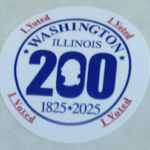 Sticker News: The Tazewell County, Illinois Clerk and Recorder of Deeds Office is honoring bicentennial celebrations for communities across the area. Over the next several years, a series of stickers will be released for communities celebrating their 200th anniversary. On Tuesday, a press conference was held at the Washington Bicentennial Office to announce the second sticker in the series. The Washington Bicentennial “I Voted” sticker was unveiled for the upcoming 2025 General Consolidated Election. Early voting for the election begins Thursday, Feb. 20. Along with the sticker, Tazewell County Clerk, John Ackerman, has also released an “I Voted” booklet to collect all the celebratory stickers until 2041. Bastrop County, Texas’ next official ballot box sticker is set to feature artwork by
Sticker News: The Tazewell County, Illinois Clerk and Recorder of Deeds Office is honoring bicentennial celebrations for communities across the area. Over the next several years, a series of stickers will be released for communities celebrating their 200th anniversary. On Tuesday, a press conference was held at the Washington Bicentennial Office to announce the second sticker in the series. The Washington Bicentennial “I Voted” sticker was unveiled for the upcoming 2025 General Consolidated Election. Early voting for the election begins Thursday, Feb. 20. Along with the sticker, Tazewell County Clerk, John Ackerman, has also released an “I Voted” booklet to collect all the celebratory stickers until 2041. Bastrop County, Texas’ next official ballot box sticker is set to feature artwork by 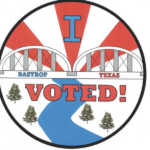 seventh grade homeschool student Tyler Hargis, who took first place in the Election Department’s second “I Voted” Sticker Contest. “The Bastrop County Elections Department was excited to once again encourage students to get excited about the electoral process,” said Elections Administrator Kristin Miles. “Thank you to all 100-plus students who submitted a design. We look forward to increasing engagement in future sticker design contests.” The first-place designs will debut during the May 2025 election period and be distributed to voters at all early voting and Election Day locations for the 2025-26 cycle. Judges selected winning entries based on theme, uniqueness of design and artistry, according to the department.
seventh grade homeschool student Tyler Hargis, who took first place in the Election Department’s second “I Voted” Sticker Contest. “The Bastrop County Elections Department was excited to once again encourage students to get excited about the electoral process,” said Elections Administrator Kristin Miles. “Thank you to all 100-plus students who submitted a design. We look forward to increasing engagement in future sticker design contests.” The first-place designs will debut during the May 2025 election period and be distributed to voters at all early voting and Election Day locations for the 2025-26 cycle. Judges selected winning entries based on theme, uniqueness of design and artistry, according to the department.
Personnel News: Former Interim Registrar of Voters Cari-Ann Burgess is no longer with Washoe County, Nevada. Michele Carew is the new Bexar County, Texas elections administrator. Robert Carr has been elected to serve on the Trumbull County, Ohio board of elections. Becky Close has been appointed Eagle County, Colorado clerk & recorder. Cathy Townsend is running for St. Lucie County, Florida supervisor of elections. Barbara Bosserman is retiring after 20 years as the Clarke County, Virginia general registrar. Alabama Secretary of State Wes Allen has announced his candidacy for lieutenant governor in 2026. Louis DeJoy has announced his plans to step down as the U.S. Postmaster General. Josie Schaub has been sworn in to the Auglaize County, Ohio board of elections.
New Research and Resources
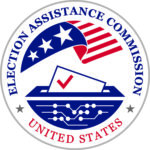 EAC Annual Report: The EAC’s Annual Report highlights the extensive achievements of the agency and the wide range of ways the EAC Commissioners and staff support election officials and the millions of voters who cast a ballot in 2024.
EAC Annual Report: The EAC’s Annual Report highlights the extensive achievements of the agency and the wide range of ways the EAC Commissioners and staff support election officials and the millions of voters who cast a ballot in 2024.
Highlights from the report include:
- The EAC formally approved the Election Supporting Technology Evaluation Program (ESTEP) as a permanent program and launched a certification program to test and certify electronic poll books. Pilot evaluation programs were also put into development for election night reporting platforms, electronic ballot delivery systems, and voter registration systems.
- The EAC’s Testing and Certification program has three systems in VVSG 2.0 testing – VotingWorks Vx Suite 4.0, Hart InterCivic’s Verity Vanguard 1.0, and Smartmatic’s VSR1 2.1.
- The EAC’s Field Services Program conducted post-certification quality monitoring tasks of voting equipment, including 54 hash verification requests, training to local election officials on hash validation best practices, and completion and documentation of two projects in Douglas County, Nebraska, and Hawaii.
- The EAC distributed $55 million in HAVA Election Security Grants and awarded a total of $1 million in Help America Vote Act College Program grants to 21 recipients from across the country.
- EAC training resources were expanded with over 1,100 election officials from 33 states and territories participating online or in-person on topics like accessibility for voters with disabilities, communications, poll worker training, federal election laws, standard operating procedures, managing stress in the workplace, and more.
- Commissioners traveled to 36 states and four territories to meet with election officials and share information on the EAC. International relations were also a focus, with the commissioners traveling to 10 countries and the EAC hosting international election officials and representatives.
- An EAC study, “Voting Experiences Since HAVA: Perspectives of People with Disabilities,” showed that election officials’ significant efforts to serve all voters. The gap for participation between voters with and without disabilities is narrowing, but there is still work to be done to close this gap.
 State Voting Rights Acts: With new legislative sessions kicking off in states across the country, MAP’s Democracy program is releasing a series of policy briefs focused on educating communities about emerging trends in election and voting-related legislation — beginning with a brief on state Voting Rights Acts. In response to the shifting landscape created by U.S. Supreme Court decisions that have stripped away some of the most important protections of the federal Voting Rights Act (VRA), some states have taken a renewed interest in putting their own voting rights protections in place. Although there are some differences between the eight states that currently have Voting Rights Acts in place, there are key requirements that advocates and lawmakers should consider when designing new laws in other states:
State Voting Rights Acts: With new legislative sessions kicking off in states across the country, MAP’s Democracy program is releasing a series of policy briefs focused on educating communities about emerging trends in election and voting-related legislation — beginning with a brief on state Voting Rights Acts. In response to the shifting landscape created by U.S. Supreme Court decisions that have stripped away some of the most important protections of the federal Voting Rights Act (VRA), some states have taken a renewed interest in putting their own voting rights protections in place. Although there are some differences between the eight states that currently have Voting Rights Acts in place, there are key requirements that advocates and lawmakers should consider when designing new laws in other states:
- Preclearance Requirements
- Vote Dilution and Denial Protections
- Language Access Requirements
- Protections Against Voter Intimidation and Election Interference
This policy brief outlines the increasing need for state-level protections to fight voter suppression and racial discrimination, explains how these policies have developed over time and how they differ between states, and offers a rundown of current proposals in the 2025 legislative session. As of January 2025, at least six states are considering legislation that would implement state Voting Rights Acts for the first time: Alabama, Arizona, Colorado, Maryland, Michigan, New Jersey. Voters are no longer able to count on the most crucial and effective parts of the federal Voting Rights Act to protect their voting rights through the courts. Beyond that, a new administration in Washington has been clear in stating its commitment to restrictive policies on voting and elections, making state-level protections more critical than eve
Ballot Measures, Legislation & Rulemaking
 Alaska Ballot Measure: Lt. Gov. Nancy Dahlstrom announced this week that she had approved the first step in the process to once again repeal ranked choice voting: certifying that the proposed ballot measure was in the proper form. This allows the sponsors to begin gathering signatures. Sponsors of the referendum will need to collect at least 34,099 signatures of registered voters, including minimum numbers of signatures in at least 30 of the 40 state House districts, to place the measure on the ballot in 2026. Proponent Bernadette Wilson of Anchorage said it was important to get started early in the 2026 election cycle due to the large number of needed signatures. She is one of three primary sponsors, along with Judy Eledge of Anchorage and Ken McCarty of Eagle River. Wilson pointed out that the 2024 ballot measure to repeal the voting system lost by a narrow margin — just 737 votes of 320,985 ballots cast. Wilson said the sponsors feel good about their chances next time, saying that some voters were confused about what a yes or no vote meant on the question. She noted that opponents of repealing the system raised nearly $15 million, compared with roughly $150,000 raised by repeal supporters.
Alaska Ballot Measure: Lt. Gov. Nancy Dahlstrom announced this week that she had approved the first step in the process to once again repeal ranked choice voting: certifying that the proposed ballot measure was in the proper form. This allows the sponsors to begin gathering signatures. Sponsors of the referendum will need to collect at least 34,099 signatures of registered voters, including minimum numbers of signatures in at least 30 of the 40 state House districts, to place the measure on the ballot in 2026. Proponent Bernadette Wilson of Anchorage said it was important to get started early in the 2026 election cycle due to the large number of needed signatures. She is one of three primary sponsors, along with Judy Eledge of Anchorage and Ken McCarty of Eagle River. Wilson pointed out that the 2024 ballot measure to repeal the voting system lost by a narrow margin — just 737 votes of 320,985 ballots cast. Wilson said the sponsors feel good about their chances next time, saying that some voters were confused about what a yes or no vote meant on the question. She noted that opponents of repealing the system raised nearly $15 million, compared with roughly $150,000 raised by repeal supporters.
 Matanuska-Susitna Borough, Alaska: During a meeting this week, the Matanuska-Susitna Borough Assembly put off a vote on a measure that would revamp voting procedures. The proposed measure, in OR 25-012, was largely a cleanup of election procedures at polling places along with approval for candidates to have 200-word statements rather than being restricted to 100 words on election materials. It was sponsored by assembly person Dimitri Fonov. However, there was criticism on part of the original measure that would have allowed some results of hand counts to be known before polls closed. Assembly member Stephanie Nowers proposed the amendment be removed, which was adopted. Now results will only be released after polls close at 8pm. A number of people showed up at the meeting expecting to testify against an earlier provision in the election code, since changed, that would have allowed devices to count paper ballots, like tabulators, to verify hand-counts. At the start of the meeting, Mayor Edna DeVries explained that the matter had been dealt with earlier in another piece of legislation.
Matanuska-Susitna Borough, Alaska: During a meeting this week, the Matanuska-Susitna Borough Assembly put off a vote on a measure that would revamp voting procedures. The proposed measure, in OR 25-012, was largely a cleanup of election procedures at polling places along with approval for candidates to have 200-word statements rather than being restricted to 100 words on election materials. It was sponsored by assembly person Dimitri Fonov. However, there was criticism on part of the original measure that would have allowed some results of hand counts to be known before polls closed. Assembly member Stephanie Nowers proposed the amendment be removed, which was adopted. Now results will only be released after polls close at 8pm. A number of people showed up at the meeting expecting to testify against an earlier provision in the election code, since changed, that would have allowed devices to count paper ballots, like tabulators, to verify hand-counts. At the start of the meeting, Mayor Edna DeVries explained that the matter had been dealt with earlier in another piece of legislation.
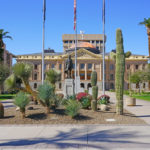 Arizona: The Legislature sent a bill designed to speed up election results to the desk of Gov. Katie Hobbs. Reforming the ballot counting process is a priority this session for Republicans, who control both chambers of the Legislature. “As promised, the first bill being sent to the governor this year is an election integrity measure,” Senate President Warren Petersen said in a press release after his chamber passed SB1011/HB2703. “Recent polling shows most Arizona voters want us to take action to speed up vote counting. We are providing our citizens exactly what they’ve asked for.” The Senate passed the legislation a day after the House, with both votes going along party lines. Chief among the provisions of the bill passed Thursday is a new deadline of 7 p.m. on the Friday before Election Day for dropping off early ballots at a voting location. It wouldn’t affect the deadline for early ballots returned by mail, which must reach election offices before the polls close at 7 p.m. on Election Day. Hobbs has vetoed the bill.
Arizona: The Legislature sent a bill designed to speed up election results to the desk of Gov. Katie Hobbs. Reforming the ballot counting process is a priority this session for Republicans, who control both chambers of the Legislature. “As promised, the first bill being sent to the governor this year is an election integrity measure,” Senate President Warren Petersen said in a press release after his chamber passed SB1011/HB2703. “Recent polling shows most Arizona voters want us to take action to speed up vote counting. We are providing our citizens exactly what they’ve asked for.” The Senate passed the legislation a day after the House, with both votes going along party lines. Chief among the provisions of the bill passed Thursday is a new deadline of 7 p.m. on the Friday before Election Day for dropping off early ballots at a voting location. It wouldn’t affect the deadline for early ballots returned by mail, which must reach election offices before the polls close at 7 p.m. on Election Day. Hobbs has vetoed the bill.
 Colorado: The Senate State, Veterans, and Military Affairs Committee approved a bill intended to establish protections in the federal Voting Rights Act at the state level in Colorado after hours of testimony and several amendments. Sen. Julie Gonzales, a Denver Democrat and sponsor of Senate Bill 25-1, said the Colorado Voting Rights Act is necessary since the federal Voting Rights Act of 1965 is “under attack.” Several court decisions have weakened the federal VRA over the last decade, and there’s growing concern that President Donald Trump’s administration could try to further erode its protections. The Colorado bill would mirror the VRA to “prohibit election practices that create disparities in participation for communities of color and other protected groups,” Gonzales said. It also includes protections for LGBTQ+ voters, expands multilingual ballot access, and requires accommodations for people with disabilities at residential facilities. The state attorney general could enforce voting rights under the Colorado measure, so “we don’t have to rely on the federal government or federal courts,” Gonzales said. The provisions of the bill would apply to all state and municipal elections. Voters whose rights are violated under the act can take action along with civil rights groups.
Colorado: The Senate State, Veterans, and Military Affairs Committee approved a bill intended to establish protections in the federal Voting Rights Act at the state level in Colorado after hours of testimony and several amendments. Sen. Julie Gonzales, a Denver Democrat and sponsor of Senate Bill 25-1, said the Colorado Voting Rights Act is necessary since the federal Voting Rights Act of 1965 is “under attack.” Several court decisions have weakened the federal VRA over the last decade, and there’s growing concern that President Donald Trump’s administration could try to further erode its protections. The Colorado bill would mirror the VRA to “prohibit election practices that create disparities in participation for communities of color and other protected groups,” Gonzales said. It also includes protections for LGBTQ+ voters, expands multilingual ballot access, and requires accommodations for people with disabilities at residential facilities. The state attorney general could enforce voting rights under the Colorado measure, so “we don’t have to rely on the federal government or federal courts,” Gonzales said. The provisions of the bill would apply to all state and municipal elections. Voters whose rights are violated under the act can take action along with civil rights groups.
 Fort Collins, Colorado: By a 5-2 vote, Fort Collins city council members approved a change to city code that would remove a provision allowing for write-in candidates. The change will be up for a final vote by the council on March 4. Council member Julie Pignataro, who serves on the Election Code Committee that recommended this change and several others, noted there is a conflict between city code and Fort Collins City Charter that could potentially lead to lawsuits if a write-in candidate were to win. City code provides guidelines for becoming a write-in candidate, but the city charter says a candidate can take office only if they are “nominated,” meaning they must gather the signatures of at least 25 registered electors. “If a write-in candidate ever won, I think that could be legally challenged in court and then that person would have to step down,” she said. Mayor Jeni Arndt said it’s “misleading to the public to allow them to run for an office when our charter says you have to be nominated. If I were the write-in candidate who prevailed in an election and then was told, ‘No, you weren’t nominated but we let you do it anyway,’ I’d see a lawyer.”
Fort Collins, Colorado: By a 5-2 vote, Fort Collins city council members approved a change to city code that would remove a provision allowing for write-in candidates. The change will be up for a final vote by the council on March 4. Council member Julie Pignataro, who serves on the Election Code Committee that recommended this change and several others, noted there is a conflict between city code and Fort Collins City Charter that could potentially lead to lawsuits if a write-in candidate were to win. City code provides guidelines for becoming a write-in candidate, but the city charter says a candidate can take office only if they are “nominated,” meaning they must gather the signatures of at least 25 registered electors. “If a write-in candidate ever won, I think that could be legally challenged in court and then that person would have to step down,” she said. Mayor Jeni Arndt said it’s “misleading to the public to allow them to run for an office when our charter says you have to be nominated. If I were the write-in candidate who prevailed in an election and then was told, ‘No, you weren’t nominated but we let you do it anyway,’ I’d see a lawyer.”
 Georgia: A House elections panel advanced a bill this week that would prevent the secretary of state from participating in a multistate database that state election officials and voting rights advocates say helps maintain accurate voter rolls. Republican members of a House elections subcommittee voted in favor of passing the so-called Voter Integrity Act. House Bill 215 would prohibit state election officials from remaining in ERIC, and sharing voter registration data with non-governmental entities. The bill was amended to allow the secretary of state to enter into other intra-state compacts for voter list data. Secretary of state’s office officials and various voting rights advocacy groups defended the ERIC system as a way to maintain accurate voter rolls and cautioned that leaving the system would be costly and inefficient for the state. Georgia now spends about $97,000 annually as one of 24 members of the election registration database. The bill now advances to the full House Governmental Affairs Committee after advancing by a party-line vote Tuesday.
Georgia: A House elections panel advanced a bill this week that would prevent the secretary of state from participating in a multistate database that state election officials and voting rights advocates say helps maintain accurate voter rolls. Republican members of a House elections subcommittee voted in favor of passing the so-called Voter Integrity Act. House Bill 215 would prohibit state election officials from remaining in ERIC, and sharing voter registration data with non-governmental entities. The bill was amended to allow the secretary of state to enter into other intra-state compacts for voter list data. Secretary of state’s office officials and various voting rights advocacy groups defended the ERIC system as a way to maintain accurate voter rolls and cautioned that leaving the system would be costly and inefficient for the state. Georgia now spends about $97,000 annually as one of 24 members of the election registration database. The bill now advances to the full House Governmental Affairs Committee after advancing by a party-line vote Tuesday.
 Hawaii: People in the state could be automatically registered to vote when getting their driver’s license or identification card. Lawmakers are considering a measure to instead have people opt out of being registered to vote versus having to opt in. If it passes, people would be automatically registered to vote by the county clerks when they submit their information to receive their ID. The county would then send people a postcard that asks them if they would like to deregister themselves from voting. Those filing for food stamps or Medicaid are already offered the option to register to vote with their paperwork. About 850,000 people are registered to vote in the state, although only about 60% voted in the 2024 general election.
Hawaii: People in the state could be automatically registered to vote when getting their driver’s license or identification card. Lawmakers are considering a measure to instead have people opt out of being registered to vote versus having to opt in. If it passes, people would be automatically registered to vote by the county clerks when they submit their information to receive their ID. The county would then send people a postcard that asks them if they would like to deregister themselves from voting. Those filing for food stamps or Medicaid are already offered the option to register to vote with their paperwork. About 850,000 people are registered to vote in the state, although only about 60% voted in the 2024 general election.
 Iowa: Lawmakers are moving closer to requiring driver’s licenses and nonoperator ID cards in the state display whether the holder is a U.S. citizen. The House Judiciary Committee voted 14-5 along party lines to pass House Study Bill 37, making it eligible for debate by the full House. Under the bill, the information displayed on a driver’s license or nonoperator ID must specify someone’s “status as a citizen of the United States or status as a noncitizen authorized to be in the United States.” The person’s citizenship status would be displayed on the back of the driver’s license or ID card. The bill’s Republican backers say the legislation will help make it easier to determine someone’s citizenship when they go to vote. “There are numerous different reasons this has come forward,” said Rep. Skyler Wheeler, R-Hull. “One of the most prevalent would be when it comes to certifying you’re a citizen when you vote, but it also can help in cases such as jury duty, as well as identity theft, international incidents and some advanced security.”
Iowa: Lawmakers are moving closer to requiring driver’s licenses and nonoperator ID cards in the state display whether the holder is a U.S. citizen. The House Judiciary Committee voted 14-5 along party lines to pass House Study Bill 37, making it eligible for debate by the full House. Under the bill, the information displayed on a driver’s license or nonoperator ID must specify someone’s “status as a citizen of the United States or status as a noncitizen authorized to be in the United States.” The person’s citizenship status would be displayed on the back of the driver’s license or ID card. The bill’s Republican backers say the legislation will help make it easier to determine someone’s citizenship when they go to vote. “There are numerous different reasons this has come forward,” said Rep. Skyler Wheeler, R-Hull. “One of the most prevalent would be when it comes to certifying you’re a citizen when you vote, but it also can help in cases such as jury duty, as well as identity theft, international incidents and some advanced security.”
Lawmakers considered a bill that would require Iowans to register with a political party 30 days before a primary or caucus. Currently, Iowans can change their party affiliation on election or caucus day. Exceptions would include if someone has never voted before, or they were registered as a no-party voter. “There were a lot of concerns that came up, you know, Democrats who were switching parties as they came into the caucus process,” State Rep. Derek Wulf (R- Hudson) the bill’s manager said. “There was a lot of discussion around, was there going to be some sabotage efforts. I don’t know if we saw that widespread, but I know that concern came up and that’s really what this bill spawned out of.” Opponents claimed there are lots of voters continuously changing their minds on which party they plan to vote for, and say this bill would negatively impact Iowans’ political freedom. They also cited concerns that election workers could face backlash. “As I read this bill, you are exposing election workers to real harassment,” Rosie Thierer, an election worker said. “I will face a voter who will be very frustrated and angry.”
 Kansas: As of Feb. 12, lawmakers in Kansas had introduced 26 bills related to elections, and four of these bills had passed a legislative chamber. In 2024, just one bill related to elections became law in Kansas. Bills legislators have advanced this year would make more consequential changes to the state’s election laws. Some of the topics align with legislation Republican-controlled state governments adopted elsewhere in recent years, while others are emerging as possible Republican priorities moving forward. On Feb. 6, Kansas lawmakers voted 29-10 to advance SB 6, a bill that would ban the use of ranked-choice voting for elections at any level. The vote was largely along party lines, with all but one Republican voting to advance the bill, and all Democrats opposed. On Feb. 11, Kansas lawmakers passed SB 4 out of the state senate by a 29-10 vote. The bill advanced almost entirely along party lines, with one Republican and all Democrats opposing passage. The bill would require that voters return absentee ballots by 7 p.m. on the day of an election. Currently, state law requires that voters return their ballot in-person on the day of the election, or postmark their ballot by Election Day. The state counts ballots postmarked by Election Day if received by the third day following an election. HCR 5004 would refer a constitutional amendment to the state’s voters asking them whether to modify the state’s constitution to more explicitly prohibit noncitizens from voting in elections in the state. Currently, noncitizens are not allowed to vote in any elections in the state, and the constitution stipulates that an individual must be a U.S. citizen to vote in elections in the state. The amendment would add language that explicitly states that no person who is not a U.S. citizen will be allowed to vote in the state. The other bill, HB 2020, would require the director of the division of motor vehicles to provide a quarterly report to the secretary of state that includes details about noncitizens issued a driver’s license.
Kansas: As of Feb. 12, lawmakers in Kansas had introduced 26 bills related to elections, and four of these bills had passed a legislative chamber. In 2024, just one bill related to elections became law in Kansas. Bills legislators have advanced this year would make more consequential changes to the state’s election laws. Some of the topics align with legislation Republican-controlled state governments adopted elsewhere in recent years, while others are emerging as possible Republican priorities moving forward. On Feb. 6, Kansas lawmakers voted 29-10 to advance SB 6, a bill that would ban the use of ranked-choice voting for elections at any level. The vote was largely along party lines, with all but one Republican voting to advance the bill, and all Democrats opposed. On Feb. 11, Kansas lawmakers passed SB 4 out of the state senate by a 29-10 vote. The bill advanced almost entirely along party lines, with one Republican and all Democrats opposing passage. The bill would require that voters return absentee ballots by 7 p.m. on the day of an election. Currently, state law requires that voters return their ballot in-person on the day of the election, or postmark their ballot by Election Day. The state counts ballots postmarked by Election Day if received by the third day following an election. HCR 5004 would refer a constitutional amendment to the state’s voters asking them whether to modify the state’s constitution to more explicitly prohibit noncitizens from voting in elections in the state. Currently, noncitizens are not allowed to vote in any elections in the state, and the constitution stipulates that an individual must be a U.S. citizen to vote in elections in the state. The amendment would add language that explicitly states that no person who is not a U.S. citizen will be allowed to vote in the state. The other bill, HB 2020, would require the director of the division of motor vehicles to provide a quarterly report to the secretary of state that includes details about noncitizens issued a driver’s license.
The House granted first-round approval this week to a bill requiring county election officers to rely on online obituaries as well as other sources when determining whether an individual should be deleted from voter registration records. Existing Kansas law directed officials in the state’s 105 counties to reference obituary notices printed by a local newspaper, the state’s weekly list of death certificates and the Social Security Administration’s annual death index when scrubbing registration lists. Consideration of the bill didn’t inspire rigorous debate among representatives on the House floor, and was advanced to final action on a voice vote. “Really all we’re doing is modernizing the statute to allow county elections officers to remove somebody from the voter roll if they appear in an online obituary,” said Rep. Brian Bergkamp, R-Wichita. The bill was introduced on behalf of Secretary of State Scott Schwab, whose office said the change would recognize fewer obituaries were published in newspapers and were increasingly likely to be posted online by funeral homes. Schwab is among Republicans considering a run for governor in 2026. “Only county election officers have the authority to remove voters from county rolls,” said Clay Barker, general counsel and deputy secretary of state for Kansas. “They must exercise prudence to ensure a complete and accurate match before removing any individual from the voter rolls.”
 Maine Ballot Measure: Secretary of State Shenna Bellows confirmed that her department validated the signatures required for the citizen petition to require identification at the polls. As stipulated by the state constitution, the initiative will now go to the Maine Legislature for consideration, which can either enact the bill as written or send it to a statewide vote in November 2025. Maine requires identification and proof of residency in order to register to vote but is among 15 states that do not require voters to present identification while at the polls. The petition only needed 67,682 signatures, which is 10% of the total votes cast in the most recent gubernatorial election, to be valid. After reviewing a little more than half of the petition forms submitted, Bellow’s department found nearly 87,000 valid signatures. In total, the campaign submitted more than 171,500 signatures to the Bureau of Corporations, Elections and Commissions on Jan. 6, according to the Department of the Secretary of State. Bellows has raised concern about the changes the Maine petition seeks beyond requiring ID at the polls, calling the petition “a wolf in sheep’s clothing.” Bellows pointed to provisions that aim to roll back ongoing absentee voting, which allows voters to have absentee ballots mailed to them automatically for each election cycle, and remove the option for municipalities to get approval for multiple ballot drop boxes as changes that would make voting harder.
Maine Ballot Measure: Secretary of State Shenna Bellows confirmed that her department validated the signatures required for the citizen petition to require identification at the polls. As stipulated by the state constitution, the initiative will now go to the Maine Legislature for consideration, which can either enact the bill as written or send it to a statewide vote in November 2025. Maine requires identification and proof of residency in order to register to vote but is among 15 states that do not require voters to present identification while at the polls. The petition only needed 67,682 signatures, which is 10% of the total votes cast in the most recent gubernatorial election, to be valid. After reviewing a little more than half of the petition forms submitted, Bellow’s department found nearly 87,000 valid signatures. In total, the campaign submitted more than 171,500 signatures to the Bureau of Corporations, Elections and Commissions on Jan. 6, according to the Department of the Secretary of State. Bellows has raised concern about the changes the Maine petition seeks beyond requiring ID at the polls, calling the petition “a wolf in sheep’s clothing.” Bellows pointed to provisions that aim to roll back ongoing absentee voting, which allows voters to have absentee ballots mailed to them automatically for each election cycle, and remove the option for municipalities to get approval for multiple ballot drop boxes as changes that would make voting harder.
 Maryland: Under House Bill 710, a measure sponsored by Montgomery County Del. Jheanelle Wilkins, a Democrat and vice chair of the committee, people convicted of a felony and serving a prison sentence could be allowed to register to vote. Republican delegates, however, questioned the logistics of the bill, which would allow incarcerated people to register to vote in the place they consider to be their residence, or the last known address for people serving life sentences, Wilkins said. “It’s really hard to tell when someone’s in jail for five years, seven years, 15 years, where they’re going to live the day they get out because they don’t know until the very end of their time,” said House Minority Leader Jason Buckel, who represents Allegany County. “The life that they had before they got incarcerated, that may be gone — their family, their connections to that community, may not exist anymore.” The measure is one of several bills Maryland lawmakers are considering this year to change election laws.
Maryland: Under House Bill 710, a measure sponsored by Montgomery County Del. Jheanelle Wilkins, a Democrat and vice chair of the committee, people convicted of a felony and serving a prison sentence could be allowed to register to vote. Republican delegates, however, questioned the logistics of the bill, which would allow incarcerated people to register to vote in the place they consider to be their residence, or the last known address for people serving life sentences, Wilkins said. “It’s really hard to tell when someone’s in jail for five years, seven years, 15 years, where they’re going to live the day they get out because they don’t know until the very end of their time,” said House Minority Leader Jason Buckel, who represents Allegany County. “The life that they had before they got incarcerated, that may be gone — their family, their connections to that community, may not exist anymore.” The measure is one of several bills Maryland lawmakers are considering this year to change election laws.
Senate Bill 66 and House Bill 781 would require the state board of elections to create guidelines for local boards to accommodate and expedite voting for older people and people with disabilities through dedicated lines, signs and priority seating. Election judges would also receive training.
Senate Bill 615 and House Bill 816 would make ballot questions posed to voters easier to understand by eliminating legal jargon and adding a statement to explain the outcome of each choice.
House Bill 253 and Senate Bill 991, would automatically send absentee ballots to registered voters in pretrial detention at correctional facilities without them having to submit absentee ballot applications.
House Bill 91, sponsored by Del. Bob Long, a Baltimore County Republican, would require in-person voters to prove their identity by showing a government-issued photo ID or a non-government ID and documents proving a voter’s name and address to an election judge.
House Bill 67, also sponsored by Long and other House Republicans, would prohibit local boards of elections from removing absentee ballots from return envelopes unless they’re signed by the voter it was issued to, excluding uniformed service members serving overseas. Signatures would be verified by comparing the signed envelope to a voter’s registration record.
 Minnesota: The Senate Elections Committee deliberated the fate of SF 1071, a bill penned by Senator Jim Carlson of DFL-Eagan, with the ambition to reshape how Minnesotans may soon cast their ballots. SF 1071 is a legislative attempt to allow counties, cities, and school districts the option to adopt ranked choice voting for both odd- and even-year elections, potentially altering the established one-person, one-vote protocol. As reported by the Senate DFL, Carlson advocates that this bill “strengthens democracy, promotes local control, and allows voters to have a stronger voice in our elections.” By a narrow 6-5 margin, the committee passed the bill, advancing it to the scrutiny of the State and Local Government Committee where the dialogue will undoubtedly continue. Carlson’s measure is not without its challenges, yet within the halls of decision, the bill indeed found just enough favor to proceed down the legislative maze. Receiving such a close vote echoes the delicate balance of opinions that currently enshroud the ranked-choice voting conversation.
Minnesota: The Senate Elections Committee deliberated the fate of SF 1071, a bill penned by Senator Jim Carlson of DFL-Eagan, with the ambition to reshape how Minnesotans may soon cast their ballots. SF 1071 is a legislative attempt to allow counties, cities, and school districts the option to adopt ranked choice voting for both odd- and even-year elections, potentially altering the established one-person, one-vote protocol. As reported by the Senate DFL, Carlson advocates that this bill “strengthens democracy, promotes local control, and allows voters to have a stronger voice in our elections.” By a narrow 6-5 margin, the committee passed the bill, advancing it to the scrutiny of the State and Local Government Committee where the dialogue will undoubtedly continue. Carlson’s measure is not without its challenges, yet within the halls of decision, the bill indeed found just enough favor to proceed down the legislative maze. Receiving such a close vote echoes the delicate balance of opinions that currently enshroud the ranked-choice voting conversation.
 Mississippi: The House let a proposal that would restore voters’ right to sidestep the Legislature and put measures on a statewide ballot died a vote last week. House Constitution Chairman Price Wallace, a Republican from Mendenhall, told Mississippi Today let the measure die by the legislative deadline because he believed the Senate would not be receptive to any ballot initiative proposal. “They’re not taking it up on that end of the building, so there’s no sense in us fighting about it down here,” Wallace said of the Senate. This would be the fourth straight year that lawmakers at the Capitol have been unable to agree on restoring the ballot initiative after the state Supreme Court in 2021 ruled the state’s initiative was unworkable because of the signature-gathering process. Despite the Mississippi Constitution explicitly stating that voters still have a right to offer amendments through an initiative process, citizens have no process to change state laws or the state Constitution.
Mississippi: The House let a proposal that would restore voters’ right to sidestep the Legislature and put measures on a statewide ballot died a vote last week. House Constitution Chairman Price Wallace, a Republican from Mendenhall, told Mississippi Today let the measure die by the legislative deadline because he believed the Senate would not be receptive to any ballot initiative proposal. “They’re not taking it up on that end of the building, so there’s no sense in us fighting about it down here,” Wallace said of the Senate. This would be the fourth straight year that lawmakers at the Capitol have been unable to agree on restoring the ballot initiative after the state Supreme Court in 2021 ruled the state’s initiative was unworkable because of the signature-gathering process. Despite the Mississippi Constitution explicitly stating that voters still have a right to offer amendments through an initiative process, citizens have no process to change state laws or the state Constitution.
 New Hampshire: Under a proposed bill the state’s largest group of voters – the more than 386,000 who in 2024 chose not to declare any party affiliation – might soon be limited in how they can participate in primary elections. A bill from House Republicans, including local Rep. Jose Cambrils from Loudon, would prohibit undeclared voters from changing their affiliation the same day as the primary to cast their ballot. The longstanding practice for undeclared voters is to register with a specific party at the polls during a primary and then switch their registration back right after voting. House Bill 172 would repeal the laws that allow that, making it so undeclared voters would need to change their party by the regular deadline – which is months in advance – to register to vote in a primary. It would still allow new and first-time voters to register on the day of the election. John Sellers, the bill’s prime sponsor from Bristol, said the idea of a primary is to let members of each party select their candidate, not members of the opposite party seeking to skew results. “What happens is … on primary day, maybe the other party has a strong candidate so the person in that party will actually literally go and register for the other party,” Sellers said. “And they’re undeclared, so they might normally vote one way but they decided on this primary to vote another way. It actually skews who actually gets elected to go forward for the general.”
New Hampshire: Under a proposed bill the state’s largest group of voters – the more than 386,000 who in 2024 chose not to declare any party affiliation – might soon be limited in how they can participate in primary elections. A bill from House Republicans, including local Rep. Jose Cambrils from Loudon, would prohibit undeclared voters from changing their affiliation the same day as the primary to cast their ballot. The longstanding practice for undeclared voters is to register with a specific party at the polls during a primary and then switch their registration back right after voting. House Bill 172 would repeal the laws that allow that, making it so undeclared voters would need to change their party by the regular deadline – which is months in advance – to register to vote in a primary. It would still allow new and first-time voters to register on the day of the election. John Sellers, the bill’s prime sponsor from Bristol, said the idea of a primary is to let members of each party select their candidate, not members of the opposite party seeking to skew results. “What happens is … on primary day, maybe the other party has a strong candidate so the person in that party will actually literally go and register for the other party,” Sellers said. “And they’re undeclared, so they might normally vote one way but they decided on this primary to vote another way. It actually skews who actually gets elected to go forward for the general.”
 North Carolina: A bill filed this week in the North Carolina House would ban third-party voter registration drives from using actual voter registration forms. House Bill 127 would make it a misdemeanor for voter registration drives to hand out real voter registration forms. It would only allow groups or individuals to hand out sample registration forms instead. The measure would also require groups conducting voter registration drives to register with county boards of elections, disclosing the scope and date of their planned activities. The author of the bill, Rep. Harry Warren, R-Rowan, says the primary reason for it is “to protect people’s personal information and to reduce their exposure to possible identity theft.” He said it will bring accountability and uniformity to voter registration efforts, citing cases of discarded voter registration forms that were never turned into elections offices. Ann Webb, policy director for voting-rights group Common Cause NC, said the proposal would criminalize voter outreach efforts conducted by groups across the political spectrum. “This will disenfranchise voters,” Webb told WRAL News. “It’s an extreme bill that will prevent community organizations from supporting other community members directly in registering to vote, and that can only be viewed as an effort to make it harder to access voting.”
North Carolina: A bill filed this week in the North Carolina House would ban third-party voter registration drives from using actual voter registration forms. House Bill 127 would make it a misdemeanor for voter registration drives to hand out real voter registration forms. It would only allow groups or individuals to hand out sample registration forms instead. The measure would also require groups conducting voter registration drives to register with county boards of elections, disclosing the scope and date of their planned activities. The author of the bill, Rep. Harry Warren, R-Rowan, says the primary reason for it is “to protect people’s personal information and to reduce their exposure to possible identity theft.” He said it will bring accountability and uniformity to voter registration efforts, citing cases of discarded voter registration forms that were never turned into elections offices. Ann Webb, policy director for voting-rights group Common Cause NC, said the proposal would criminalize voter outreach efforts conducted by groups across the political spectrum. “This will disenfranchise voters,” Webb told WRAL News. “It’s an extreme bill that will prevent community organizations from supporting other community members directly in registering to vote, and that can only be viewed as an effort to make it harder to access voting.”
 Oklahoma: The House Elections and Ethics Committee heard a bill from freshman Representative Molly Jenkins that would require Oklahomans to give a reason for requesting an absentee ballot. “Voting is a right that we have,” said Jenkins, R-Coyle. “This is simply a measure that will allow us the opportunity to make sure that people are being responsible.” If passed, voters would have to check a box on a list of reasons for asking to vote absentee when requesting an absentee ballot. Those include several reasons such as illness, disability, military service, religion, and age. “What’s the purpose here? What are we trying to solve?” said Rep. Mickey Dollens, D-Oklahoma City. “We know in the last presidential election there is no cases of absentee voter fraud. So I think the purpose of this is to make it harder for people to vote.” Dollens, who is also in the Election and Ethics committee, voted against the legislation. He said the bill was cumbersome and required an explanation every time an absentee ballot was requested. Other lawmakers questioned if the move would do more harm than good by discouraging absentee ballots. Lawmakers ended up voting in a 3-3 tie on the legislation. Speaker Pro Tem Anthony Moore, who was not at the meeting for discussions, came in and casted the deciding vote, voting for the bill. It will now move forward.
Oklahoma: The House Elections and Ethics Committee heard a bill from freshman Representative Molly Jenkins that would require Oklahomans to give a reason for requesting an absentee ballot. “Voting is a right that we have,” said Jenkins, R-Coyle. “This is simply a measure that will allow us the opportunity to make sure that people are being responsible.” If passed, voters would have to check a box on a list of reasons for asking to vote absentee when requesting an absentee ballot. Those include several reasons such as illness, disability, military service, religion, and age. “What’s the purpose here? What are we trying to solve?” said Rep. Mickey Dollens, D-Oklahoma City. “We know in the last presidential election there is no cases of absentee voter fraud. So I think the purpose of this is to make it harder for people to vote.” Dollens, who is also in the Election and Ethics committee, voted against the legislation. He said the bill was cumbersome and required an explanation every time an absentee ballot was requested. Other lawmakers questioned if the move would do more harm than good by discouraging absentee ballots. Lawmakers ended up voting in a 3-3 tie on the legislation. Speaker Pro Tem Anthony Moore, who was not at the meeting for discussions, came in and casted the deciding vote, voting for the bill. It will now move forward.
 South Dakota: The super-majority of Republicans in the House of Representatives is calling for more changes to South Dakota’s election processes. They voted 47-22 for House Bill 1066 that would require a person to live and usually sleep in South Dakota for “at least 30 consecutive days” in order to be considered a resident for voter-registration purposes. Adding the word “continuous” would be a change from current law that says the person must live “within the state for at least thirty days prior to submitting the registration form.” Republican Rep. Tony Kayser is the prime sponsor. He was questioned by Republican Rep. Kent Roe about how the change would affect over-the-road truck drivers and others who, according to Roe, likely wouldn’t be in South Dakota for 30 days in a row. “Nothing changes. The truck driver has to have some place they revert to,” Kayser answered. “It carries with you as you go.” Roe said he would vote no because he fears “an unintended disenfranchisement of certain people.” The House State Affairs version of HB 1066 now heads to the Senate, where Republican John Carley is lead sponsor.
South Dakota: The super-majority of Republicans in the House of Representatives is calling for more changes to South Dakota’s election processes. They voted 47-22 for House Bill 1066 that would require a person to live and usually sleep in South Dakota for “at least 30 consecutive days” in order to be considered a resident for voter-registration purposes. Adding the word “continuous” would be a change from current law that says the person must live “within the state for at least thirty days prior to submitting the registration form.” Republican Rep. Tony Kayser is the prime sponsor. He was questioned by Republican Rep. Kent Roe about how the change would affect over-the-road truck drivers and others who, according to Roe, likely wouldn’t be in South Dakota for 30 days in a row. “Nothing changes. The truck driver has to have some place they revert to,” Kayser answered. “It carries with you as you go.” Roe said he would vote no because he fears “an unintended disenfranchisement of certain people.” The House State Affairs version of HB 1066 now heads to the Senate, where Republican John Carley is lead sponsor.
Republicans also heavily supported a proposed change in state law regarding gathering signatures to place a constitutional amendment on the South Dakota election ballot. Current state law says, “All measures proposed by initiative shall be presented by petition. The petition shall be signed by not less than five percent of the qualified electors of the state.” Republican Rep. Rebecca Reimer wants to change the requirement, so that sponsors of proposed constitutional amendments would need signatures from 5% of registered voters in all 35 of the Legislature’s Senate districts. She closed with two words about House Bill 1169: “Vote green.” They did — 60-9 — to send the House State Affairs version to the Senate. Republican Tom Pischke is lead sponsor.
 Hidalgo County, Texas: Hidalgo County has joined a growing list of Texas counties pushing back against proposed statewide legislation that would do away with countywide voting programs. “Hidalgo County is not for the elimination of the countywide polling place program,” Hidalgo County Elections Administrator Hilda Salinas said. Hidalgo County commissioners unanimously passed a resolution in support of countywide voting after Dallas-area Republican Senator Bob Hall introduced a bill into the 89th legislative session that would ban it across the state. Hidalgo County’s resolution also opposes two other bills authored by Hall that call for the end of electronic poll books and marking devices. Hidalgo County uses electronic marking devices, which allow voters to cast ballots electronically and verify their choices on screen before printing a paper ballot “It allows the voter to make sure that all their selections are correct and that everything came out OK before they in turn take the ballot to their scanner where it is tabulated,” Salinas said. According to Salinas, getting rid of the electronic markers would mean changing the county’s election process, which would cost taxpayers. “It would cost millions,” Salinas said. “If it would revert back to direct recording electronic devices with a paper ballot on demand if you choose, either way we would have to update our system.”
Hidalgo County, Texas: Hidalgo County has joined a growing list of Texas counties pushing back against proposed statewide legislation that would do away with countywide voting programs. “Hidalgo County is not for the elimination of the countywide polling place program,” Hidalgo County Elections Administrator Hilda Salinas said. Hidalgo County commissioners unanimously passed a resolution in support of countywide voting after Dallas-area Republican Senator Bob Hall introduced a bill into the 89th legislative session that would ban it across the state. Hidalgo County’s resolution also opposes two other bills authored by Hall that call for the end of electronic poll books and marking devices. Hidalgo County uses electronic marking devices, which allow voters to cast ballots electronically and verify their choices on screen before printing a paper ballot “It allows the voter to make sure that all their selections are correct and that everything came out OK before they in turn take the ballot to their scanner where it is tabulated,” Salinas said. According to Salinas, getting rid of the electronic markers would mean changing the county’s election process, which would cost taxpayers. “It would cost millions,” Salinas said. “If it would revert back to direct recording electronic devices with a paper ballot on demand if you choose, either way we would have to update our system.”
 Utah: The Republican-controlled House voted 59-13 to pass HB332 to remove the state from ERIC. It now goes to the Senate for further consideration. If it’s passed by the full Utah Legislature and signed by Gov. Spencer Cox, Utah would become the next state to separate from ERIC, a nonprofit meant to help states maintain their voter rolls by sharing information across state lines. With HB332, House Majority Whip Karianne Lisonbee, R-Clearfield, wants to set new requirements for the lieutenant governor to report on efforts to maintain accuracy of voter rolls. It would also require the lieutenant governor to withdraw Utah from ERIC by July 6. In its place, the state’s top election official would have the option to enter into agreements with other states to share information or contract with a different third party to maintain voter rolls. isonbee said the rest of her bill is also focused on acting on several recommendations legislative auditors listed in a recent audit report that concluded Utah faces no “significant fraud,” but found some errors on Utah’s voter lists. That audit found 1,400 “likely matches” to deceased voters that hadn’t been removed, with 700 that were marked as “active” voters. Auditors found that ballots were cast for two voters that matched as “deceased” in the November 2023 election.
Utah: The Republican-controlled House voted 59-13 to pass HB332 to remove the state from ERIC. It now goes to the Senate for further consideration. If it’s passed by the full Utah Legislature and signed by Gov. Spencer Cox, Utah would become the next state to separate from ERIC, a nonprofit meant to help states maintain their voter rolls by sharing information across state lines. With HB332, House Majority Whip Karianne Lisonbee, R-Clearfield, wants to set new requirements for the lieutenant governor to report on efforts to maintain accuracy of voter rolls. It would also require the lieutenant governor to withdraw Utah from ERIC by July 6. In its place, the state’s top election official would have the option to enter into agreements with other states to share information or contract with a different third party to maintain voter rolls. isonbee said the rest of her bill is also focused on acting on several recommendations legislative auditors listed in a recent audit report that concluded Utah faces no “significant fraud,” but found some errors on Utah’s voter lists. That audit found 1,400 “likely matches” to deceased voters that hadn’t been removed, with 700 that were marked as “active” voters. Auditors found that ballots were cast for two voters that matched as “deceased” in the November 2023 election.
 Washington: In a move aimed at broadening voter participation, the Washington State Senate has passed Senate Bill 5077 (SB 5077) on a straight party-line vote of 30-19 with all Democrats voting in favor and all Republicans voting against. The bill mandates that the governor, in consultation with the secretary of state, identify additional state, local, federal and tribal agencies that can implement automated voter registration. This includes agencies that collect personal information such as names, residential addresses, dates of birth and citizenship verification. The goal is to streamline the voter registration process by leveraging existing data from these agencies. The bill also authorizes the Health Benefit Exchange (HBE) to provide applicant information from the Washington Healthplanfinder to the SOS for voter registration purposes, contingent upon federal approval. Applicants will be notified and given the option to decline within 15 days; if they do not opt-out, their information will be used to register them to vote. Additionally, SB 5077 clarifies the role of the Department of Corrections in facilitating voter registration for individuals transitioning from incarceration. Registrations will be marked as “pending” until the individual becomes eligible to vote.
Washington: In a move aimed at broadening voter participation, the Washington State Senate has passed Senate Bill 5077 (SB 5077) on a straight party-line vote of 30-19 with all Democrats voting in favor and all Republicans voting against. The bill mandates that the governor, in consultation with the secretary of state, identify additional state, local, federal and tribal agencies that can implement automated voter registration. This includes agencies that collect personal information such as names, residential addresses, dates of birth and citizenship verification. The goal is to streamline the voter registration process by leveraging existing data from these agencies. The bill also authorizes the Health Benefit Exchange (HBE) to provide applicant information from the Washington Healthplanfinder to the SOS for voter registration purposes, contingent upon federal approval. Applicants will be notified and given the option to decline within 15 days; if they do not opt-out, their information will be used to register them to vote. Additionally, SB 5077 clarifies the role of the Department of Corrections in facilitating voter registration for individuals transitioning from incarceration. Registrations will be marked as “pending” until the individual becomes eligible to vote.
Senate Bill 5382 would require those gathering initiative signatures to sign a declaration under penalty of false swearing that information written by signers is accurate and they were not paid for their signature. It also directs the secretary of state, in validating signatures, to verify the address listed by a person on an initiative or referendum petition is the same as the one that is on their voter registration card. It passed the Senate State Government, Tribal Affairs and Elections Committee on a party-line 5-4 vote. In a statement, Secretary of State Steve Hobbs said anything that adds barriers or impediments to the initiative process “is not helpful to Washingtonians.” “Adding a voter’s residential address to the process of validating voters’ eligibility to sign an initiative petition is unnecessary and won’t help voters in any demonstrative way,” Hobbs said.
 Wyoming: Members of a House’s Transportation, Highways and Military Affairs Committee successfully added the word “citizen” after “Not a U.S.” to print on the back of driver’s licenses and state ID cards issued to non U.S. citizens during their discussion of a Senate bill last week. Senate File 33, “Noncitizen driver’s license and ID card-revisions,” requires creating a new driver’s license and state ID for those who are in the country legally, but are not a U.S. citizen. The bill is making steady progress through the general session, having passed through the Senate and crossed over to the House of Representatives. It barely passed the House’s Transportation, Highways and Military Affairs Committee in a 5-4 vote, and has to pass three more readings on the House floor before it goes back to the Senate. There are an estimated 6,000 permanent Wyoming residents who are not U.S. citizens, according to expert testimony. It would cost the Wyoming Department of Transportation an estimated $67,000 to print the words “Not a U.S. citizen” on the back of these licenses and state IDs, according to the Legislative Service Office.
Wyoming: Members of a House’s Transportation, Highways and Military Affairs Committee successfully added the word “citizen” after “Not a U.S.” to print on the back of driver’s licenses and state ID cards issued to non U.S. citizens during their discussion of a Senate bill last week. Senate File 33, “Noncitizen driver’s license and ID card-revisions,” requires creating a new driver’s license and state ID for those who are in the country legally, but are not a U.S. citizen. The bill is making steady progress through the general session, having passed through the Senate and crossed over to the House of Representatives. It barely passed the House’s Transportation, Highways and Military Affairs Committee in a 5-4 vote, and has to pass three more readings on the House floor before it goes back to the Senate. There are an estimated 6,000 permanent Wyoming residents who are not U.S. citizens, according to expert testimony. It would cost the Wyoming Department of Transportation an estimated $67,000 to print the words “Not a U.S. citizen” on the back of these licenses and state IDs, according to the Legislative Service Office.
If a bill banning ballot drop boxes passes into law as amended, Wyoming voters would be allowed to deposit ballots through a slot in the wall at the courthouse, not unlike a safety deposit box or night depository at a bank. The Senate Corporations, Elections and Political Subdivisions Committee unanimously passed the amendment to House Bill 131, a bill banning ballot drop boxes in Wyoming. Secretary of State Chuck Gray, who has supported HB 131, said he has to study the amendment more before issuing an opinion on it. Sen. Brian Boner, R-Douglas, brought the amendment. He indicated the amendment would help the bill advance through his committee. The committee passed HB 131 on a 3-2 vote, with Boner and Sens. Cheri Steinmetz, R-Lingle, Dan Dockstader, R-Afton, voting for it and Sens. Cale Case, R-Lander, and Bill Landen, R-Casper, voting against it. Boner believes having a slot to turn in ballots in the wall of a courthouse would be a more secure option than the ballot drop boxes, which although secured to the ground and under video surveillance, could still easily be harmed through a malicious act made by a member of the public.
Legal Updates
 California: Atty. Gen. Rob Bonta asked appellate court justices to speed up their challenge to Huntington Beach’s new voter identification requirement, slated to go into effect in 2026. The attorney general’s office last month appealed a lower court dismissal of a lawsuit against the city over the voter ID requirement. But that appeal involved a narrower legal question of the timeliness of the legal challenge, which an Orange County Superior Court judge found was not yet ripe. Now the attorney general’s office and Secretary of State Shirley Weber want appellate justices to decide the merits of the entire case to speed up the legal process. If the attorney general had prevailed on the appeal filed last month, it would have likely led to the case being sent back to the lower court judge to decide the merits. “Secretary Weber and I continue to believe that Huntington Beach’s Measure A is unlawful,” Bonta said in a statement. “With preparations for the 2026 elections beginning late this year, time is of the essence.” City officials have maintained, as they have in other legal disputes with the state, that they have separate authority as a charter city. But state officials say state law supersedes any city ordinances that come into conflict. The state’s writ argues that the state lacks “an adequate, speedy remedy at law.” The writ also argues that the legal question is significant in that it involves the right to vote and the “constitutional separation of powers between charter cities and the state.”
California: Atty. Gen. Rob Bonta asked appellate court justices to speed up their challenge to Huntington Beach’s new voter identification requirement, slated to go into effect in 2026. The attorney general’s office last month appealed a lower court dismissal of a lawsuit against the city over the voter ID requirement. But that appeal involved a narrower legal question of the timeliness of the legal challenge, which an Orange County Superior Court judge found was not yet ripe. Now the attorney general’s office and Secretary of State Shirley Weber want appellate justices to decide the merits of the entire case to speed up the legal process. If the attorney general had prevailed on the appeal filed last month, it would have likely led to the case being sent back to the lower court judge to decide the merits. “Secretary Weber and I continue to believe that Huntington Beach’s Measure A is unlawful,” Bonta said in a statement. “With preparations for the 2026 elections beginning late this year, time is of the essence.” City officials have maintained, as they have in other legal disputes with the state, that they have separate authority as a charter city. But state officials say state law supersedes any city ordinances that come into conflict. The state’s writ argues that the state lacks “an adequate, speedy remedy at law.” The writ also argues that the legal question is significant in that it involves the right to vote and the “constitutional separation of powers between charter cities and the state.”
 Georgia: Nicholas Wimbish, 25 of Midgeville, a former Georgia poll worker who sent a written bomb threat to an election superintendent under the guise of a voter was convicted last week. Wimbish pleaded guilty to providing false information about a bomb threat and making hoaxes, said Melissa Hodges, spokeswoman for the U.S. Attorney’s Office for the Middle District of Georgia. He is scheduled to be sentenced in May and faces up to five years in prison, plus an additional three years of supervised release, and a maximum fine of $250,000. There is no parole in the federal system. “Bomb hoaxes and similar threats create grave and unnecessary disruptions in our communities, pulling vital law enforcement resources and terrifying people,” acting U.S. Attorney C. Shanelle Booker said in a statement.
Georgia: Nicholas Wimbish, 25 of Midgeville, a former Georgia poll worker who sent a written bomb threat to an election superintendent under the guise of a voter was convicted last week. Wimbish pleaded guilty to providing false information about a bomb threat and making hoaxes, said Melissa Hodges, spokeswoman for the U.S. Attorney’s Office for the Middle District of Georgia. He is scheduled to be sentenced in May and faces up to five years in prison, plus an additional three years of supervised release, and a maximum fine of $250,000. There is no parole in the federal system. “Bomb hoaxes and similar threats create grave and unnecessary disruptions in our communities, pulling vital law enforcement resources and terrifying people,” acting U.S. Attorney C. Shanelle Booker said in a statement.
 Missouri: Former Clay County Republican election official Patricia Lamb is facing criminal charges after a forensic audit uncovered more than $15,000 in unauthorized expenses, extra payroll payments, and undocumented reimbursements linked to her county-issued credit card. A probable cause statement filed on July 17, 2024, accuses former Lamb of financial misconduct, including forgery, fraudulent use of a credit device, and filing false documents. According to investigators, a review of Lamb’s county-issued business credit card revealed $8,126.51 in non-business-related charges and undocumented expenses. A forensic audit also found $1,336 in questionable mileage reimbursements, $200 in undocumented petty cash payments, and two extra payroll checks in 2022 totaling $6,278.40—exceeding her authorized salary. The Clay County Election Board placed Lamb on paid administrative leave on Oct. 11, 2023, before terminating her on Jan. 24, 2024. Authorities later attempted to contact her for an interview but believe she may have left the area or state. A warrant was issued for her arrest on Sept. 5 after she failed to appear in court.
Missouri: Former Clay County Republican election official Patricia Lamb is facing criminal charges after a forensic audit uncovered more than $15,000 in unauthorized expenses, extra payroll payments, and undocumented reimbursements linked to her county-issued credit card. A probable cause statement filed on July 17, 2024, accuses former Lamb of financial misconduct, including forgery, fraudulent use of a credit device, and filing false documents. According to investigators, a review of Lamb’s county-issued business credit card revealed $8,126.51 in non-business-related charges and undocumented expenses. A forensic audit also found $1,336 in questionable mileage reimbursements, $200 in undocumented petty cash payments, and two extra payroll checks in 2022 totaling $6,278.40—exceeding her authorized salary. The Clay County Election Board placed Lamb on paid administrative leave on Oct. 11, 2023, before terminating her on Jan. 24, 2024. Authorities later attempted to contact her for an interview but believe she may have left the area or state. A warrant was issued for her arrest on Sept. 5 after she failed to appear in court.
 New Jersey: Former Atlantic City council president Craig Callaway pleaded guilty to voter fraud charges over his role in a 2022 mail ballot fraud scheme that saw voters’ mail ballots collected and cast without their knowledge. Callaway, a Democratic operative first charged a year ago, admitted in federal court in Camden Thursday that he and others paid individuals $30 to $50 to act as messengers for would-be voters. Callaway and his subordinates would fill those ballots before having them returned, the operative admitted. “The defendant admitted to depriving New Jersey residents of a fair election by participating in a scheme to cast ballots for voters who did not vote in the election,” said acting U.S. Attorney Vikas Khanna. “Along with our law enforcement partners, we are committed to prosecuting those who criminally seek to undermine impartially conducted elections.” Numerous residents, in whose names mail ballots were cast and collected as part of the scheme, told authorities they did not vote that year or authorize Callaway, his subordinates, or others to cast ballots on their behalf. Callaway faces up to five years imprisonment, a fine of up to $250,000, and three years of supervised release for the single charge of procuring, casting, and tabulating fraudulent ballots. Sentencing is set for June 17.
New Jersey: Former Atlantic City council president Craig Callaway pleaded guilty to voter fraud charges over his role in a 2022 mail ballot fraud scheme that saw voters’ mail ballots collected and cast without their knowledge. Callaway, a Democratic operative first charged a year ago, admitted in federal court in Camden Thursday that he and others paid individuals $30 to $50 to act as messengers for would-be voters. Callaway and his subordinates would fill those ballots before having them returned, the operative admitted. “The defendant admitted to depriving New Jersey residents of a fair election by participating in a scheme to cast ballots for voters who did not vote in the election,” said acting U.S. Attorney Vikas Khanna. “Along with our law enforcement partners, we are committed to prosecuting those who criminally seek to undermine impartially conducted elections.” Numerous residents, in whose names mail ballots were cast and collected as part of the scheme, told authorities they did not vote that year or authorize Callaway, his subordinates, or others to cast ballots on their behalf. Callaway faces up to five years imprisonment, a fine of up to $250,000, and three years of supervised release for the single charge of procuring, casting, and tabulating fraudulent ballots. Sentencing is set for June 17.
 North Carolina: The North Carolina State Board of Elections filed a bypass petition this week asking the state Supreme Court to decide an ongoing 2024 election dispute — currently before the state court of appeals — in which GOP candidate Jefferson Griffin is seeking to overturn his loss to incumbent Democratic Justice Allison Riggs. Following a recent Wake County Superior Court ruling rejecting Griffin’s bid to throw out 65,000 votes, the losing state Supreme Court candidate — and sitting state appeals court judge — took his case to the North Carolina Court of Appeals. But in yesterday’s petition, the state board of elections asked North Carolina’s highest court to bypass the court of appeals and take up the case in order to promptly resolve the weighty election-related matter that’s been proceeding for months. “Immediate review is appropriate because the subject matter of this appeal has significant public interest, the appeal involves legal principles of major significance, and delay in this Court’s review is likely to cause substantial harm,” the petition reads. Riggs — who is recused from the case — expressed her support for the bypass petition, while Griffin said he opposes it. If the justices grant the board’s petition and hypothetically deadlock in a 3-3 split on the merits of Griffin’s arguments, then the Wake County Superior Court’s denial of his challenge would remain in place. However, if the justices reject the bypass petition and allow the Republican-dominated court of appeals to hear the case first, then an evenly divided ruling from the high court would allow the appeals court’s ultimate decision to stand.
North Carolina: The North Carolina State Board of Elections filed a bypass petition this week asking the state Supreme Court to decide an ongoing 2024 election dispute — currently before the state court of appeals — in which GOP candidate Jefferson Griffin is seeking to overturn his loss to incumbent Democratic Justice Allison Riggs. Following a recent Wake County Superior Court ruling rejecting Griffin’s bid to throw out 65,000 votes, the losing state Supreme Court candidate — and sitting state appeals court judge — took his case to the North Carolina Court of Appeals. But in yesterday’s petition, the state board of elections asked North Carolina’s highest court to bypass the court of appeals and take up the case in order to promptly resolve the weighty election-related matter that’s been proceeding for months. “Immediate review is appropriate because the subject matter of this appeal has significant public interest, the appeal involves legal principles of major significance, and delay in this Court’s review is likely to cause substantial harm,” the petition reads. Riggs — who is recused from the case — expressed her support for the bypass petition, while Griffin said he opposes it. If the justices grant the board’s petition and hypothetically deadlock in a 3-3 split on the merits of Griffin’s arguments, then the Wake County Superior Court’s denial of his challenge would remain in place. However, if the justices reject the bypass petition and allow the Republican-dominated court of appeals to hear the case first, then an evenly divided ruling from the high court would allow the appeals court’s ultimate decision to stand.
 Virginia: Attorney Thomas Ranieri is appealing a circuit judge’s November ruling that ordered the two Waynesboro Electoral Board officials to certify the local election results. Ranieri has sent a notice of errors to the Virginia Court of Appeals based on Circuit Judge Paul Dryer’s ruling that ordered former Electoral Board Chairman Curtis Lilly II and Vice Chairman Scott Mares to certify the November election results in the city. The pair, part of a conservative majority on the three-person board, had sued the Virginia Department of Elections in October saying that the use of vote-counting machines is unconstitutional because voting officials cannot witness the counting of ballots. They also argued that such machines are connected to the internet and can be hacked, which is not true. Lilly and Mares sought to withhold election certification until there could be a hand-count of the votes. Waynesboro residents countersued, arguing that their rights as citizens were being upended by the officials. Dryer sided with the plaintiffs, arguing that election certification is ministerial and not discretionary. The judge ordered the certification, saying “the court enjoins defendants from violating the plaintiffs’ constitutional right to have their legally cast votes counted.” Mares and Lilly have since left office. Mares finished his term in December and was not reappointed. The Virginia State Board of Elections last month held a hearing on Lilly and voted 5-0 to seek his removal. An affidavit provided to the state board by Waynesboro Director of Elections and Registrar Lisa Jeffers described the lawsuit by the two electoral board members as a “complete abuse of power.” Lilly, who served as chairman and then vice chairman, resigned from the Waynesboro Electoral Board two weeks ago. Ranieri said his goal in continuing the court fight is to bring more transparency to Virginia elections.
Virginia: Attorney Thomas Ranieri is appealing a circuit judge’s November ruling that ordered the two Waynesboro Electoral Board officials to certify the local election results. Ranieri has sent a notice of errors to the Virginia Court of Appeals based on Circuit Judge Paul Dryer’s ruling that ordered former Electoral Board Chairman Curtis Lilly II and Vice Chairman Scott Mares to certify the November election results in the city. The pair, part of a conservative majority on the three-person board, had sued the Virginia Department of Elections in October saying that the use of vote-counting machines is unconstitutional because voting officials cannot witness the counting of ballots. They also argued that such machines are connected to the internet and can be hacked, which is not true. Lilly and Mares sought to withhold election certification until there could be a hand-count of the votes. Waynesboro residents countersued, arguing that their rights as citizens were being upended by the officials. Dryer sided with the plaintiffs, arguing that election certification is ministerial and not discretionary. The judge ordered the certification, saying “the court enjoins defendants from violating the plaintiffs’ constitutional right to have their legally cast votes counted.” Mares and Lilly have since left office. Mares finished his term in December and was not reappointed. The Virginia State Board of Elections last month held a hearing on Lilly and voted 5-0 to seek his removal. An affidavit provided to the state board by Waynesboro Director of Elections and Registrar Lisa Jeffers described the lawsuit by the two electoral board members as a “complete abuse of power.” Lilly, who served as chairman and then vice chairman, resigned from the Waynesboro Electoral Board two weeks ago. Ranieri said his goal in continuing the court fight is to bring more transparency to Virginia elections.
 Washington: Prosecutors in Island County have filed new charges against a Republican election observer who refused to wear a mask while inside a ballot count room last November. Timothy Hazelo, 57, of Oak Harbor, was already facing a disorderly conduct misdemeanor for the Nov. 4 mask dispute at the Island County Elections office. In court documents filed last week, Island County Prosecuting Attorney Gregory Banks charged Hazelo with one count of unauthorized access to a voting center, a class C felony, as well as misdemeanor counts of disorderly conduct and criminal trespass. In a sheriff’s arrest report, Island County Sheriff’s deputies said they responded to the county elections office on Nov. 4 after an election official said Hazelo was refusing to wear a mask in the room where ballots were being counted. The report noted there was a posted policy in the office that required workers and observers to wear masks. “It was determined Hazelo would be offered one final opportunity to comply with the policy set by the Island County Auditor to wear a mask in the ballot processing rooms, and if he continued to refuse to comply with the policy, he would be asked to exit the room,” the report stated. Body camera video of the encounter showed deputies telling Hazelo he had to leave the room or wear a mask. The deputy’s report alleged Hazelo turned to an election worker and said ‘I know who you are” before leaving the room. That worker told deputies he felt threatened by the comment.
Washington: Prosecutors in Island County have filed new charges against a Republican election observer who refused to wear a mask while inside a ballot count room last November. Timothy Hazelo, 57, of Oak Harbor, was already facing a disorderly conduct misdemeanor for the Nov. 4 mask dispute at the Island County Elections office. In court documents filed last week, Island County Prosecuting Attorney Gregory Banks charged Hazelo with one count of unauthorized access to a voting center, a class C felony, as well as misdemeanor counts of disorderly conduct and criminal trespass. In a sheriff’s arrest report, Island County Sheriff’s deputies said they responded to the county elections office on Nov. 4 after an election official said Hazelo was refusing to wear a mask in the room where ballots were being counted. The report noted there was a posted policy in the office that required workers and observers to wear masks. “It was determined Hazelo would be offered one final opportunity to comply with the policy set by the Island County Auditor to wear a mask in the ballot processing rooms, and if he continued to refuse to comply with the policy, he would be asked to exit the room,” the report stated. Body camera video of the encounter showed deputies telling Hazelo he had to leave the room or wear a mask. The deputy’s report alleged Hazelo turned to an election worker and said ‘I know who you are” before leaving the room. That worker told deputies he felt threatened by the comment.
 Wisconsin: On a 4-3 vote the Wisconsin Supreme Court rejected a lawsuit against the Wisconsin Elections Commission for not acting against the city of Racine after the city used mobile vans for in-person early voting in an election two years ago. The ruling, written by Justice Jill Karofsky and concurred in by the three other members of the Court’s liberal majority, declared that the voter who brought the case lacked standing to demand a judicial review of the commission’s decision. The case arose from a challenge to Racine’s use in the August 2022 primary election of a van that was sent around the city for early voting, also called in-person absentee voting, in the weeks before Election Day. For the primary election that summer, Racine’s city clerk designated 22 early voting sites: City Hall and 21 other locations around the city. The clerk’s office dispatched a van with election equipment to those 21 sites for which notices were posted. Voters could obtain absentee ballots, vote and return their ballots to the vehicle. On behalf of a Racine voter, the Wisconsin Institute for Law & Liberty, a right-wing law firm that has supported other challenges to local and state election practices, filed a complaint with the Wisconsin Elections Commission (WEC) charging that using the van for early voting violated state law. The commission rejected the complaint, and WILL filed a petition in Racine County Circuit Court for judicial review of WEC’s decision. Judge Eugene Gasiorkiewicz ruled in January 2024 in WILL’s favor that the early voting van favored Democratic parts of the city and violated state law. The judge held that the state law authorizing municipalities to establish alternate early voting locations applies to physical structures, not mobile vehicles. State law neither affirms nor prohibits mobile early voting sites, he wrote, but lacking “an express prohibition . . . does not mean mobile absentee ballot sites comport to procedures specified in the election laws.” The Supreme Court ruling sidesteps a direct interpretation of that question. Karofsky wrote that the voter WILL represented lacked standing to take WEC to court over the issue. State law authorizes an election official or a person who files a complaint “who is aggrieved” by a WEC order to take the matter to circuit court. Karofsky wrote that not everyone on the losing side of a WEC order is “aggrieved,” however, and that “to be aggrieved by a decision, one must have suffered an injury to a legally recognized interest as a result of the decision.” The plaintiff in the WILL lawsuit, Kenneth Brown, didn’t show he suffered or will suffer an injury, she wrote.
Wisconsin: On a 4-3 vote the Wisconsin Supreme Court rejected a lawsuit against the Wisconsin Elections Commission for not acting against the city of Racine after the city used mobile vans for in-person early voting in an election two years ago. The ruling, written by Justice Jill Karofsky and concurred in by the three other members of the Court’s liberal majority, declared that the voter who brought the case lacked standing to demand a judicial review of the commission’s decision. The case arose from a challenge to Racine’s use in the August 2022 primary election of a van that was sent around the city for early voting, also called in-person absentee voting, in the weeks before Election Day. For the primary election that summer, Racine’s city clerk designated 22 early voting sites: City Hall and 21 other locations around the city. The clerk’s office dispatched a van with election equipment to those 21 sites for which notices were posted. Voters could obtain absentee ballots, vote and return their ballots to the vehicle. On behalf of a Racine voter, the Wisconsin Institute for Law & Liberty, a right-wing law firm that has supported other challenges to local and state election practices, filed a complaint with the Wisconsin Elections Commission (WEC) charging that using the van for early voting violated state law. The commission rejected the complaint, and WILL filed a petition in Racine County Circuit Court for judicial review of WEC’s decision. Judge Eugene Gasiorkiewicz ruled in January 2024 in WILL’s favor that the early voting van favored Democratic parts of the city and violated state law. The judge held that the state law authorizing municipalities to establish alternate early voting locations applies to physical structures, not mobile vehicles. State law neither affirms nor prohibits mobile early voting sites, he wrote, but lacking “an express prohibition . . . does not mean mobile absentee ballot sites comport to procedures specified in the election laws.” The Supreme Court ruling sidesteps a direct interpretation of that question. Karofsky wrote that the voter WILL represented lacked standing to take WEC to court over the issue. State law authorizes an election official or a person who files a complaint “who is aggrieved” by a WEC order to take the matter to circuit court. Karofsky wrote that not everyone on the losing side of a WEC order is “aggrieved,” however, and that “to be aggrieved by a decision, one must have suffered an injury to a legally recognized interest as a result of the decision.” The plaintiff in the WILL lawsuit, Kenneth Brown, didn’t show he suffered or will suffer an injury, she wrote.
Opinions This Week
National Opinions: U.S. Department of Justice, II | Universal voting | Democracy | Project 2025 | SAVE Act
Alabama: Ranked choice voting
Arizona: Citizenship
Arkansas: Ballot measures
Colorado: Election dates | Voting rights
Connecticut: Early voting
Indiana: Election legislation | Voting rights
Maryland: Voting age
North Carolina: Supreme Court race | Voter registration
Texas: Bexar County
Utah: Vote by mail | Election legislation
Upcoming Events
Katherine Stewart — Money, Lies, and God: Inside the Movement to Destroy American Democracy: Why have so many Americans turned against democracy? In this deeply reported book, Katherine Stewart takes us to conferences of conspiracy-mongers, backroom strategy gatherings, and services at extremist churches, and profiles the people who want to tear it all down. She introduces us to reactionary Catholic activists, atheist billionaires, pseudo-Platonist intellectuals, self-appointed apostles of Jesus, disciples of Ayn Rand, women-hating opponents of “the gynocracy,” pronatalists preoccupied with the dearth of white babies, Covid truthers, militia members masquerading as “concerned moms” and battalions of spirit warriors who appear to be inventing a new style of religion even as they set about attacking democracy at its foundations. Along the way, she provides a compelling analysis of the authoritarian reaction in the United States. She demonstrates that the movement relies on several distinct constituencies, with very different and often conflicting agendas. Stewart’s reporting and comprehensive political analysis helps reframe the conversation about the moral collapse of conservatism in America and points the way forward toward a democratic future. When: Feb. 20, 7pm Eastern. Where: Washington, DC.
Antidemocratic: A Conversation with David Daley: In 1965, voting rights advocates secured the passage of the Voting Rights Act. The law removed some discriminatory barriers that Black and other historically disenfranchised voters faced at the polls. From day one of its passage, however, this legislation has been attacked in state legislatures and the courts — most notably, the U.S. Supreme Court. In “Antidemocratic,” author David Daley outlines the beginning of a movement within the legal system that helped pave the way for the decision in Shelby County v. Holder, a Supreme Court case that gutted the Voting Rights Act. According to Daley, fringe theories about our elections threaten to undermine our democracy and silence voters. In a conversation with CLC’s Senior Vice President Bruce V. Spiva, Daley will discuss what pro-democracy advocates can do to protect the freedom to vote. When: Feb. 21, 1:15pm Eastern. Where: Online
2025 ESRA Call for Proposals: The 9th Annual Summer Conference on Election Science, Reform, and Administration (ESRA) will be held in-person from Monday, June 9th to Wednesday, June 11th at Florida State University in Tallahassee, FL. The conference is interdisciplinary and invites participation from scholars across a variety of fields including political science, public administration, law, public policy, computer science, statistics, engineering and from election administrators. The purpose of the conference is to engage both election practitioners and scholars alike on pressing topics related to U.S. elections by providing a forum for collaboration and exchange that can stimulate policy evaluation and innovation. Unlike traditional academic conferences, ESRA seeks to facilitate a shared space between academics and election professionals so as to encourage the practical applications of scholarly research in the field. We hope that a wide variety of topics will be addressed at the conference. We are particularly interested in new and innovative projects that evaluate the way U.S. elections are currently administered and how they may be reformed. When: Deadline is Feb. 21.
Election Center February Special Workshop: The Election Center Special Workshop will be held in Little Rock, Arkansas. The workshop will run from February 26-28 and will be followed by CERA classes on March 1 & 2. Registration will open the moment the new Election Center website goes live. In the meantime, the hotel room block is open and accepting reservations at a nightly room rate of $139.00 excluding taxes. The workshop will take place at the DoubleTree Downtown Little Rock. The CERA courses offered are: Course 6 (Communications & Public Relations); Course 7 (Enhancing Voter Participation); Course 8 (Implementing New Programs); and Renewal Course 39 (Bipartisanship & Election Administration). When: February 26- March 2. Where: Little Rock, Arkansas.
What Do Documentary Proof of Citizenship Requirements for Voter Registration Accomplish?: The Safeguarding Democracy Project at UCLA promotes research, collaboration, and advocacy under the leadership of UCLA Law Professor Richard L. Hasen; one of the nation’s leading election scholars. The Safeguarding Democracy Project is built upon the premise that tackling issues of the U.S. election integrity must be collaborative: across ideologies, across scholarly disciplines, and as a bridge between theory and practice. This session will feature: Adrian Fontes, Arizona Secretary of State, Walter Olson, Senior Fellow at the Cato Institute, and Nina Perales, Vice President of Litigation, MALDEF (Mexican American Legal Defense and Educational Fund) and be moderated by Richard L. Hasen, (Director, Safeguarding Democracy Project, UCLA). When: March 4, 3:15pm Eastern. Where: Online and Los Angeles
Combating False Election Information Lessons from 2024 and a Look to the Future: The Safeguarding Democracy Project at UCLA promotes research, collaboration, and advocacy under the leadership of UCLA Law Professor Richard L. Hasen; one of the nation’s leading election scholars. The Safeguarding Democracy Project is built upon the premise that tackling issues of the U.S. election integrity must be collaborative: across ideologies, across scholarly disciplines, and as a bridge between theory and practice. This session will feature speakers: Alice Marwick, Director of Research, Data & Society, UNC Chapel Hill, Kate Starbird, University of Washington, and Joshua Tucker, NYU and moderator Richard L. Hasen, (Director, Safeguarding Democracy Project, UCLA). When: March 31 3:15pm Eastern. Where: Online.
Partisan Primaries, Polarization, and the Risks of Extremism: The Safeguarding Democracy Project at UCLA promotes research, collaboration, and advocacy under the leadership of UCLA Law Professor Richard L. Hasen; one of the nation’s leading election scholars. The Safeguarding Democracy Project is built upon the premise that tackling issues of the U.S. election integrity must be collaborative: across ideologies, across scholarly disciplines, and as a bridge between theory and practice. This session will feature speakers: Julia Azari, Marquette University, Ned Foley, The University of Ohio, Moritz College of Law, Seth Masket, Denver University, and Rick Pildes, NYU Law School and moderator Richard L. Hasen, (Director, Safeguarding Democracy Project, UCLA). When: April 10, 3:15pm Eastern. Where: Online
Election Center April Special Workshop: The Election Center April Special Workshop will be held in Pittsburgh. The conference will run April 23-25 and CERA courses will be offered April 26 and 27. The CERA courses offered will be: Course 9 (History III, 1965 to present); Course 10 (Constitutional Law of Elections); and Renewal Course 38 (Leadership in Election Administration). More information available as soon as the new Election Center website goes live. When: April 23-27. Where: Pittsburgh, Pennsylvania.
Election Center Annual Conference: The Election Center Annual Conference will be held in Salt Lake City. The conference will run August 20-22 and CERA courses will be offered August 23 and 24. The CERA courses offered will be: Course 5 (Ethics); Course 6 (Communications & Public Relations); and Two renewal courses to be announced. More information available as soon as the new Election Center website goes live. When: August 20 to 24. Where: Salt Lake City.
Job Postings
electionlineWeekly publishes election administration job postings each week as a free service to our readers. To have your job listed in the newsletter, please send a copy of the job description, including a web link to mmoretti@electionline.org. Job postings must be received by 5pm on Wednesday in order to appear in the Thursday newsletter. Listings will run for three weeks or till the deadline listed in the posting.
Administrative Coordinator (Spanish Language Program), Dallas County, Texas– Assists with the planning and coordinating of day-to-day fiscal, administrative and operational activities for a defined funded program or project to ensure that goals and objectives are accomplished in accordance with established priorities, time limitations, funding limitations or other specifications. Responsibilities: 1. Assists in developing and scheduling program work plan in accordance with specifications and funding limitations; oversees daily operations and coordinates activities of program; determines priorities. 2. Assists in ensuring the service delivery network meets the needs of the intended population, reflects the objectives and intent of the program or project, and meets applicable federal guidelines. 3. Assists in coordinating activities of program with interrelated activities of other programs, departments or staff to ensure optimum efficiency and compliance with appropriate policies, procedures and specifications. 4. Assists in evaluating program effectiveness to develop improved methods; devises evaluation methodology and implements; analyzing results and recommends and/or takes appropriate action. 5. Assists in writing, editing, and coordinating the development of promotional, educational, and training materials, newsletters, or brochures, as appropriate to the program. 6. Assists in collecting and analyzing data; preparing scheduled and special reports; maintaining program/project records and statistical information. 7. Assists with grant and/or proposal writing as appropriate to the objectives and funding nature of the program. 8. Assists with the preparation of periodic reports, financial statements and records on program activities, progress, status or other special reports for management or outside agencies. 9. Performs other duties as assigned. Salary Range: $24.22-$30.22/hour. Deadline: Feb. 24. Application: For the complete job listing and to apply, click here.
Administrative Services Coordinator, Seminole County, Florida – The Administrative Services Coordinator is a key member of the Supervisor of Elections Office, responsible for ensuring smooth administrative operations with a focus on accounting functions, candidate services, and payroll processing. This position requires attention to detail, organizational skills, and the ability to effectively handle multiple responsibilities while maintaining confidentiality and compliance with applicable laws and regulations. This position is responsible for accounts payable and receivable tasks, including processing invoices and payments, reconciling financial transactions and preparing monthly reports for review, assisting with budget preparation, tracking, and forecasting in collaboration with senior staff, ensuring compliance with state and local financial policies and procedures, and oversight of candidate qualifying and maintaining related reports and records. Salary: $45,000 – $50,000 Annually. Application: For the complete job listing and to apply, click here.
Ballot Processing Supervisor, King County, Washington–This is an amazing opportunity to be engaged in the election process! The Department of Elections is searching for energetic and resourceful professionals who like to “get stuff done”. The Ballot Processing Supervisor position in the Elections Department combines an exciting, fast paced environment with the opportunity to cultivate talents and apply a variety of skills. The ideal candidate will thrive in an innovative and fast-paced environment and will not hesitate to roll up both sleeves, work hard, have fun, and get the job done. This position reports to the Ballot Processing Manager and provides support for the Ballot Processing program, including Ballot Opening and Inspection, Scanning, and Ballot Review as well as supervising results tabulation and posting to the web. This position is also responsible for planning and executing tabulation system Logic & Accuracy tests, audits, system upgrades and recount activities as well as assisting the Ballot Processing Manager with the Observer Program. The person in this role will supervise between 3 full time staff and up to 200 temporary staff depending on the size of the election or recount. Salary:$40.24 – $51.00 Hourly. Deadline: March 12. Application: For the complete listing and to apply, click here.
Candidate Services Coordinator, Seminole County, Florida – The Candidate Services Coordinator is a key member of the Supervisor of Elections Office, responsible for ensuring smooth administrative operations with a focus on candidate services and assists with accounting functions and payroll processing. This position requires attention to detail, organizational skills, and the ability to effectively handle multiple responsibilities while maintaining confidentiality and compliance with applicable laws and regulations. This position is responsible for managing the candidate qualifying process, serving as primary point of contact for candidates, maintaining accurate records related to candidate filings, financial disclosures, and other required documentation, and coordinating candidate workshops and providing training on election procedures and campaign finance rules. Salary: $36,000 – $46,000 Annually. Application: For the complete job listing and to apply, click here.
County Clerk, Lane County, Oregon– Lane County is seeking an experienced and dynamic leader to serve as County Clerk and Election & Recording Principal Manager, overseeing critical functions that uphold the integrity of our democratic processes and public records. This pivotal role leads a dedicated team committed to excellence, accuracy, and service to our community. As County Clerk, you will: Plan, organize, and conduct all federal, state, and local elections; Oversee voter registration, property tax appeals, and permanent real property records; Manage marriage licensing, domestic partnership registrations, and archived records; Ensure compliance with Federal, State, and Local laws governing elections and records; Lead a team of 14 full-time employees, ensuring exceptional service and operational efficiency; and Prepare and analyze data, manage budgets, and oversee technology solutions that support Clerk operations. This is a fast-paced, high-impact role where you’ll serve as Lane County’s Clerk and Election & Recording Principal Manager, working under the direction of the Director of Operations to deliver services that affect all residents. Why Lane County? Lane County, the fourth most populous county in Oregon, offers a rich and diverse landscape stretching from the Pacific Ocean to the Cascade Mountains. Our county seat, Eugene, is a vibrant community with ample opportunities for living, working, and recreation. We are proud to offer an excellent benefits package and the chance to make a meaningful impact in public service. Salary: $90,625.60 – $133,286.40 Annually. Application: For the complete job listing and to apply, click here.
Customer Support Consultant, Hart InterCivic– A Customer Support Center Consultant Level 1 (CSC 1) responds to requests for assistance from Hart InterCivic customers for all Hart InterCivic products. The CSC I’s primary responsibilities are to: Answer, resolve and route customer queries; Maintain professionalism and “customer first” approach in stressful situations; Acquire, demonstrate, and maintain depth of knowledge with all Hart products and product documentation to best support Hart customers; Acquire and maintain functional support-level knowledge of unique customer requirements and their implementation in Hart products; Provide data tracking, reporting, and analytics for CSC projects; Manage and maintain the security of Hart’s assets and customer information; and Serve as a backup/overflow resource Technical Services Workstation deployment and RMA management. Application: For the complete job listing and to apply, click here.
Deputy Elections Administrator, Collin County, Texas– Collin County is seeking candidates for the position of Deputy Elections Administrator. This position manages and supervises the department by handling the election process and election personnel, assisting with administrative and clerical support, preparing contracts and cost records, assisting in hiring and firing decisions and requisition approval. Related duties include submitting actual cost records for payment, tabulating and reporting votes, supervising early voting coordinators, voter registration coordinators, and other clerical personnel, and acting as the state funds management liaison. Performs related duties as required. Work is performed under the direction of the Elections Administrator. Candidates must possess a broad knowledge, normally acquired through four years of college resulting in a Bachelor’s degree. At least two years of related experience are required. Must possess and maintain a valid Texas Class C Driver’s License and have the ability to read election codes and documents. Starting Salary: $86,701. Application: For the complete job listing and to apply, click here.
Election Specialist, Candidate Services, Palm Beach County, Florida– This position is responsible for the management and execution of services provided to candidates, political committees, electioneering communication organizations, political parties, community development districts, and special taxing districts. This includes establishing and maintaining an organized system for managing the required forms and records associated with filing and qualifying for office, candidate petitions, campaign finance reporting, financial disclosures, initiative petitions, and other related activities. Candidate Services staff must be organized and personable with a great attitude, be able to work well in a team environment, and meet deadlines under pressure. Excellent work ethic, including consistent performance, integrity, reliability, and attendance, is a must. Must be detail-oriented, be able to handle simultaneous projects, and be a self-starter. Salary: $21.63 – $24.04. Application: For the complete job listing and to apply, click here.
Elections Manager, Douglas County, Nebraska– Incumbent works under the direction of the Election Commissioner or designee, providing direction in the management of commission staff and the administration of elections in adherence to Federal, State and Local statutes. Essential Functions: Manage office and field operations (e.g. voter registration, voter education and outreach, community communications, election mapping, computer systems, election databases, candidate filings, ballot preparation, absentee voting, poll worker recruitment and training, polling place management, election day logistics, vote tabulation and reporting, payroll, and purchasing). Establish and maintain effective work relationships with clients, supervisors, County employees, elected officials, attorneys, law enforcement, judges, other agencies, and the public. Comply with Civil Service policies and regulations, collective bargaining agreements, County policies, department policies and laws to create a cooperative, safe, respectful and quality work environment. Supervise assigned staff (e.g. hiring, orienting, training, monitoring, evaluating, recommending personnel actions). Assist in planning, implementation, administration and evaluation of Election Commission plans, policies and procedures. Monitor federal and state legislation related to the election process and recommend changes in practices and procedures. Implement and ensure adherence to federal government regulations governing voter registration and election processes as defined in the Help America Vote Act. Assist in preparing and managing the Election Commission budget. Coordinate Election Commission functions with other departments, outside agencies and private contractors. Use GIS and mapping software, proofing election boundaries and precincts. Promote a safe working environment for employees. Plan and organize a personal work schedule, set priorities and meet deadlines. Oversee counting and canvass boards. Perform special projects. Prepare and maintain various records, reports, correspondence, and other departmental documents. Safely operate a motor vehicle when required to travel on County business. Report to work at assigned work location with regular, consistent attendance. Perform other related duties as assigned and directed. Salary: $6,963.93 – $11,143.93 Monthly. Deadline: March 2. Application: For the complete job listing and to apply, click here.
Elections Manager, Alexandria, Virginia– The Elections Manager directs and coordinates the elections operation in the City of Alexandria. The employee in this class has primary responsibility for directing the conduct of early voting and by-mail ballot processes. The Elections Manager is responsible for properly programming the voting machines to ensure a totally accurate recording and accounting of votes, as well as the security, maintenance, repair and transportation of all voting machines, and for negotiation and arrangement for use of facilities as voting precincts. The Elections Manager serves as the primary supervisor for warehouse inventory and logistics Responsibilities also include hiring and training of election officials to staff the polls and arranging for the printing of ballots. The Elections Manager serves as Acting General Registrar and Director of Elections in the absence of the General Registrar and Director of Elections. The work is performed under the general direction and guidance of the General Registrar and Director of Elections and must meet all guidelines of election law and departmental standards. Salary: $76,232.26 – $121,682.08 Annually. Deadline: Feb. 21. Application: For the complete job listing and to apply, click here.
Elections & Recording Manager, Marion County, Oregon– The County Clerk’s Office is responsible for conducting elections, issuing marriage licenses, recording specified documents, maintaining official records and coordinating the Board of Property Tax Appeal as required by law. The Elections and Recording Manager is responsible for managing the technical and administrative activities of licensing and recording, elections, maintenance of official records, and coordinating the Board of Property Tax Appeals. This individual also serves as the County’s Records Officer’s designee and ensures that recording activities comply with federal, state and local statutes, regulations and rules. Specific functions include records storage, microfilming and digital imaging operations, retention and disposition scheduling, archival storage and information management. This individual works closely and cooperatively with the County Clerk to ensure the County Clerk remains informed of all critical issues. This individual may also represent the County Clerk in public meetings and presentations. Salary: $89,481.60 – $119,870.40 Annually. Deadline: March 4. Application: For the complete job listing and to apply, click here.
Elections Technician, Marion County, Oregon– Marion County is seeking a motivated individual to serve as an Election Technician. In this critical role, you will oversee the daily management and administration of voter registration files. As an Election Technician, you will play a key role in facilitating voter access, maintaining election integrity, and ensuring smooth election operations. If you are passionate about elections and public service, we encourage you to apply and join our team in making a meaningful impact. Provides assistance to the Elections and Recording Manager. Assumes primary responsibility for specific technical and operational functions of the elections process for Marion County. Manages multiple tasks in compliance with state and federal laws, rules, and regulations. Does related work as required. Salary: $22.81 – $30.56 Hourly. Deadline: March 4. Application: For the complete job listing and to apply, click here.
Elections Warehouse Manager, Dallas County, Texas—Manages warehouse staff and functions, to include, equipment maintenance and repair, and supply inventory. Management Scope: Manages approximately twenty (20) warehouse personnel. Responsibilities: 1. Supervises all personnel assigned to the elections warehouse, to include hiring, directing, evaluating, disciplining and terminating employees. 2. Provides systems training to warehouse personnel and governmental entities that rent equipment from Dallas County. 3. Manages the maintenance of current systems and schedules maintenance calls for election day. 4. Coordinates the early voting process, ensuring equipment is assigned to appropriate locations. 5. Assist with budget preparation. 6. Performs other duties as assigned. Salary Range: $4666-$7279. Deadline: Feb. 27. Application: For the complete job listing and to apply, click here.
Harris Regional Services Technician, Hart InterCivic – A Harris Regional Services Technician responds to all customer requests ranging from training requests to phone support requests, to onsite repair of voting equipment requests. This individual is one of the local customer support routes. The position requires residency in Harris County, Texas. The Regional Service Technician handles all Return Material Authorization (RMA) requests for external customers for all Hart InterCivic Verity products within his/her region and provides on-site customer support and troubleshooting on an as-needed basis. This position will adhere to the Proprietary Information and Intellectual Property Agreement as it defines and communicates this position’s responsibilities to protect the Company’s information and information security. This responsibility extends outside the organization’s premises and outside normal working hours, e.g., in the case of work-from-home. Application: For the complete job listing and to apply, click here.
Information Technology Manager, Sarasota County, Florida– The Information Technology (IT) manager plays a crucial role in overseeing and managing the technological infrastructure essential for conducting secure, efficient and accurate elections. The IT manager is responsible for the general management of the IT department staff and engages in technical, administrative and supervisory work, including interaction with directors, other managers and departments, vendors and county and state agencies. The manager must maintain knowledge of all IT and technical systems used to support the operations of the elections office. Salary Range: $67,912 – $115,460. Application: For the complete job listing and to apply, click here.
IT Assistant Manager, Palm Beach County, Florida– The Assistant IT Manager plays a supportive role in the smooth operation of the IT department, ensuring that both the technical infrastructure and the team are aligned with the organization’s goals. This position involves collaborating closely with the Election Technology Director to oversee the implementation of technology solutions that meet the needs of the organization. The Assistant IT Manager helps maintain an efficient and effective IT environment. Oversee daily operations of the IT department, including help desk operations and performance, troubleshooting issues, and ensuring efficient workflow. Hold department meetings and provide weekly performance summary. Manage IT projects under the direction of the Election Technology Director, ensuring timely completion, budget requirements, and organizational needs. Enforce IT policies and procedures to ensure data security, network access, and system availability. Assist in the management of IT staff by developing skills, coaching, and communicating job expectations. Coordinate vendor renewals, assist with IT budget development, and manage grant applications. Evaluate and assist in maintaining the organization’s disaster recovery and business continuity plans for IT. Assist with IT Public Records requests research and fulfillment. Assist the Election Technology Director in all facets of IT operations. Lead projects and mentor team members. Application: For the complete job listing and to apply, click here.
Language Access & Outreach Coordinator, King County, Washington–This is an amazing opportunity to be engaged in the election process! The Department of Elections is searching for energetic and resourceful professionals who like to “get stuff done”. The Language Access and Outreach Coordinator position in the Elections Department combines an exciting, fast paced environment with the opportunity to cultivate talents and apply a variety of skills. The ideal candidate will thrive in a collaborative, innovative, and fast-paced environment and will not hesitate to roll up both sleeves, work hard, have fun, and get the job done. The Language Services and Community Engagement Team at King County Elections provides language access work for the whole Elections Department, translating election materials into six languages (Chinese, Korean, Russian, Somali, Spanish, and Vietnamese). In addition, the Team works collaboratively across Department and with community to identify and remove barriers to voting. These communities include those who are disabled, experiencing houselessness, immigrants, youth, and those with limited mobility. This team is recruiting a Language Access and Outreach Coordinator who will support the program for the Chinese language. This position provides bilingual assistance, translation, and community outreach support. This individual must be able to read, write, understand, and speak Chinese at the language proficiency testing level used by the Department. In addition, as part of the community engagement program, this individual will participate in voter registration and voter education activities with community partners and provide support to our Voter Education Fund partners. This position will provide language access assistance to our communications team and administrative support to other election work groups as needed. Salary: $38.37 – $48.64 Hourly. Application: For the complete job listing and to apply, click here.
Mail Ballot Elections Supervisor, Dallas County, Texas – Assists with managing the administration and operation of an election program area, to include program planning, supervising the work of others, establishing goals and objectives, developing schedules, priorities and standards for achieving goals, and coordinating and evaluating program activities. Management Scope: Supervises exempt and non-exempt staff. Responsibilities 1. Assists management by planning, organizing, delegating and overseeing the daily operations of one or more areas of responsibility associated with the election process. 2. Oversees the election program area to ensure staffing coverage is adequate, and productivity standards are met and are effective; develops and implements goals and objectives, performance measures and techniques to evaluate programmatic activities; reviews correspondence and reports from local, state and/or federal agencies; analyzes statistical data and prepares and maintains related reports. 3. Researches and maintains comprehensive knowledge and understanding of applicable laws, policies and procedures to effectively communicate with staff, and acts as liaison and departmental representative to elected officials, political representatives, candidates, judges, contracting customers, vendors, general public, and/or other county, state and federal representatives to resolve problems, answer questions, provide assistance and modify policies/procedures. 4. Hires and trains supervisory and support staff, evaluates performance and initiates disciplinary actions; coordinates and monitors scheduling, productivity and workloads. 5. Assists in budget preparation and maintains related data and reports. 6. Performs other duties as assigned. Salary Range: $4666 – $5822. Deadline: Feb. 24. Application: For the complete job listing and to apply, click here.
Manager, Professional Services, HartIntercivic– Project Managers at Hart InterCivic are highly motivated “self-starters” who are enthusiastic about providing exceptional customer service. Working with other members of the Professional Services and Operations teams, the Project Manager directs activity, solves problems, and develops lasting and strong relationships with our customers. Hart InterCivic’s unique and industry-known culture of innovation, transparency, and customer-centric focus creates an environment where team members will continually grow and be challenged to develop their careers. Application: For the complete job listing and to apply, click here.
Online Voting System Product Owner, Free Democracy Foundation – The Free Democracy Foundation seeks to increase trust in democracy by supporting new, innovative ways to help all eligible voters access a ballot safely and know their vote counts. Free Democracy is furthering this mission by: Supporting technology solutions to make voting more convenient, accessible and verifiable, including by supporting the development of an open source cryptographic protocol to facilitate end-to-end verifiable mobile voting; Making the technology solutions available, including by providing the enabling technology to third-party vendors to develop, market, and implement for use in public elections; and Educating democratic stakeholders to be informed users of end-to-end verifiable internet voting technology. About the Role: We are seeking an experienced and innovative Online Voting System Product Owner to work with independent vendors to design and develop accessible, usable, and scalable online voting solutions using the open source cryptographic protocol we are currently developing. As the Product Owner under contract, you will play a pivotal role in bringing systems to market to facilitate secure, end-to-end verifiable mobile voting that makes voting more accessible, transparent, and verifiable. As a key public-facing technical leader, you will work alongside the CEO and Board to champion our technology through clear communication, technical expertise, and thoughtful engagement with the election technology community. Your role combines product and technical leadership with public advocacy, helping to drive adoption and acceptance of secure mobile voting solutions through both technical excellence and effective stakeholder engagement. Application: For the complete job listing and to apply, click here.
Physical Security Specialist, Palm Beach County, Florida– This position is responsible for administration of the physical security programs in a manner consistent with Supervisor of Elections Office policies, procedures, quality standards, and applicable local, state, and federal regulations. These programs include conducting facility security risk assessments, assisting with access control, monitoring alarms and CCTV systems, and providing security related training. Must be organized and personable with a great attitude, be able to work well in a team environment, and meet deadlines under pressure. Excellent work ethic, including consistent performance, integrity, reliability, and attendance, is a must. Candidate must be detail-oriented and understand the importance of security and safety for all. Must be available 24/7 365, be able to handle simultaneous projects, and be a self-starter. Application: For the complete job listing and to apply, click here.
Research Scientist, MEDSL– To oversee the data science workflow of the lab’s election-related data collection, processing, and dissemination efforts including assisting the director with designing and implementing research projects, gathering and analyzing data, designing research protocols, and documenting results; managing data science and quality control for the 2018 release of the Elections Performance Index (EPI); acquiring data from government sources and designing protocols to update indicators not provided by government sources; assisting with redistricting data collection/dissemination efforts; working with web designers to update EPI website and creating original content for MEDSL website; onboarding and monitoring the work of students/research support associates; tracking scholarship in the field of election science; and performing other data science/administrative/reporting duties as assigned. MEDSL aims to improve the democratic experience for all U.S. voters by applying scientific principles to how elections are studied and administered. Application: For the complete job listing and to apply, click here.
Senior Deputy Registrar, Alexandria, Virginia – A Senior Deputy Registrar manages the voter registration processes and the electronic pollbook system in the Office of Voter Registration & Elections. An employee in this position coordinates complex voter registration records to ensure compliance with all applicable federal and state election laws. Additionally, they coordinate the training for Election Officers on the electronic pollbook system with the Elections Manager. The Senior Deputy Registrar provides guidance and training to Deputy Registrar Is, IIs and III and Election Officers. The incumbent in this class examines and certifies candidate petitions and investigates complex voter registration scenarios to solve problems that occur at polls on election day. Work requires that all materials meet the guidelines of election law and department standards. Salary: $51,599.60 – $90,802.92 Annually. Deadline: Feb. 21. Application: For the complete job listing and to apply, click here.
Senior Elections Supervisor, Placer County, California– The Placer County Clerk-Recorder-Elections Office has a current vacancy for a Senior Elections Supervisor. The Office is looking for someone with experience in the development, supervision, and administration of elections programs. The ideal candidate will have supervised in an elections office or similar agency that emphasizes cooperation, accountability and transparency and has the ability to communicate effectively with management, staff, other county departments, jurisdictions and the voters of Placer County. To learn more about the Elections Division of the Clerk-Recorder-Elections Office please click here. In addition to the minimum education and experience, the ideal candidate will possess experience and vision in the following areas: State and federal election laws; Voting systems; General operating policies and functions of the California Secretary of State’s Office; Best practices and current trends in successful election administration, community education and outreach programs; Principles and techniques of effective employee supervision and development, training, management practices and public administration. Salary: $69,056.00 – $86,195.20/year. Application: For the complete job listing and to apply, click here.
Voter Services Clerk, Seminole County, Florida – The Voter Services Clerk serves as the primary customer service representative for the Seminole County Supervisor of Elections Office. This position is responsible for the accurate maintenance and entry of voter registration information, ensuring the integrity and confidentiality of voter data, and providing essential assistance to voters, including answering inquiries and processing voter-related documents. The Clerk will also be involved in various clerical and administrative tasks associated with voter services, ensuring compliance with applicable state and federal election laws. Responsibilities include processing new voter registrations, updates or changes to existing registrations, vote-by-mail ballot requests, and returns, as well as petition verifications and other voter record-related tasks, providing accurate voter registration and election information to the public in person, by phone, or via mail, in accordance with Florida state laws, regulations, and procedures, conducting research to resolve issues related to voter registration records, utilizing sources both within the voter database and external government websites or online resources, ensuring the accuracy and completeness of voter registration records by verifying information, validating signatures on candidate and initiative petitions, maintaining and update street maintenance files to ensure an up-to-date and accurate residential address database for Seminole County. Salary: $17 – $22 Hourly. Application: For the complete job listing and to apply, click here.
Marketplace
electionline provides no guarantees as to the quality of the items being sold and the accuracy of the information provided about the sale items in the Marketplace. Ads are provided directly by sellers and are not verified by electionline. If you have an ad for Marketplace, please email it to: mmoretti@electionline.org